
by Ria Olivier | Jul 21, 2022 | Research, SA Agulhas II, Science, SEAmester, Southern Ocean
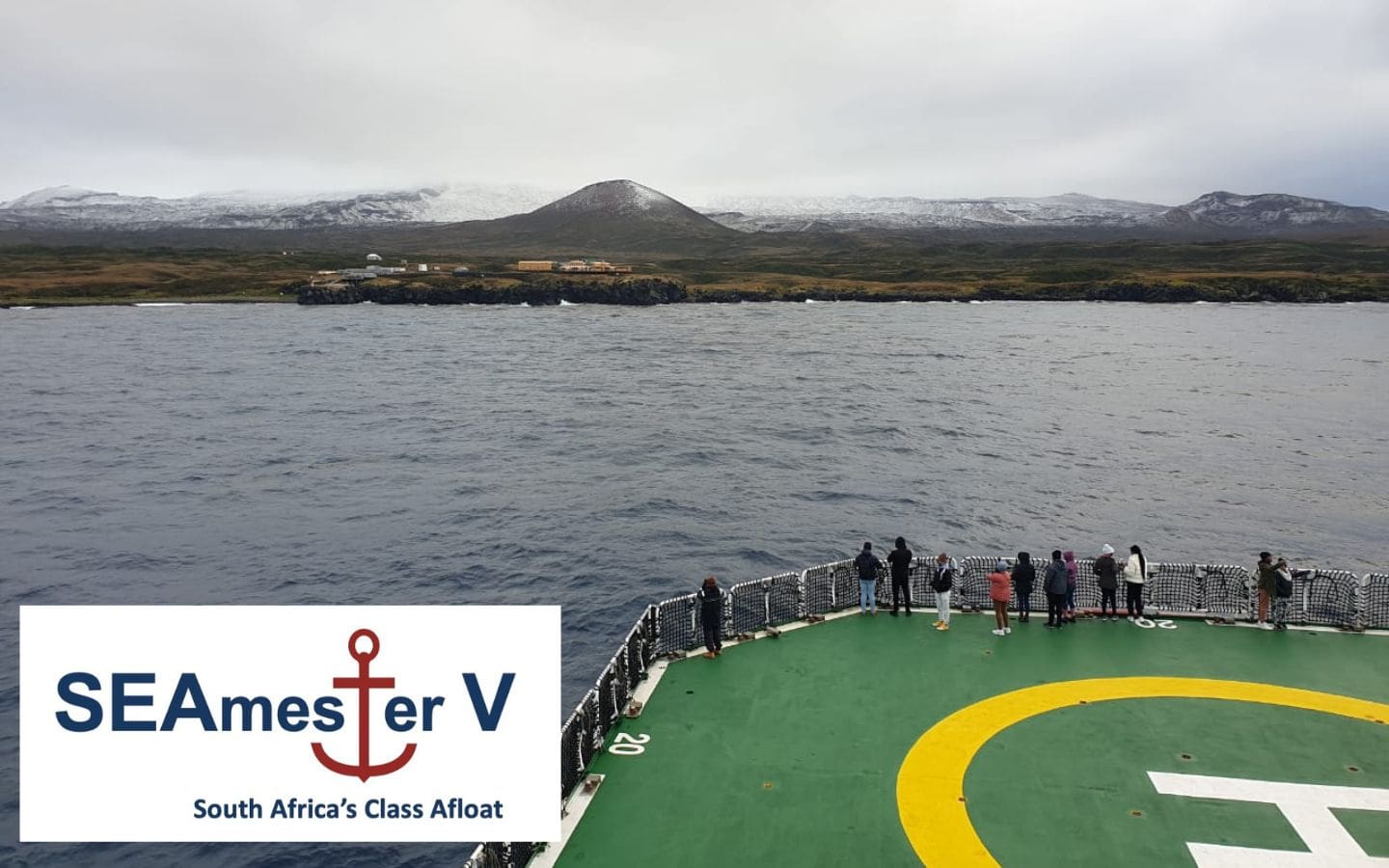
SEAmester – South Africa’s Class Afloat was started by Prof Isabelle Ansorge, Head of Oceanography, UCT in 2016 and coordinated by Tahlia Henry.
The program was birthed in the wake of formerly known as DST’s, Global Grand Challenge was issued to explore platforms that “attract young researchers to the region and retain them by exciting their interest in aspects of global change; while developing their capacity and professional skills in the relevant fields of investigation”. SEAmester has fulfilled this challenge with a program designed to bring together South African postgraduate students, within the marine sciences from over 19+ universities to participate in a multi-disciplinary learning cruise aboard flagship research vessel, the S.A. Agulhas II.
After a long 2-year long hiatus of the SEAmester program, due to the COVID-19 pandemic, SEAmester made a valiant return this year setting sail on the 27th of June – the 8th of July 2022.
A number of eager students applied this year but only 37 were selected and divided into two separate streams, namely “Tools of the Trade” and “Oceans in a Changing Climate”. Each stream caters to the vast world of marine science, with “Tools of the Trade” focussing on instrumentation/physical oceanography and the “Oceans in a Changing Climate” focusing on biological/chemical oceanography. Each stream has a dedicated team of lecturers on board who deliver comprehensive lectures and talks followed by hands-on deck work and practicals on a daily basis. A third stream is offered to all students which is the “Art” stream, this allows students to be creative in tasks such as tiled mosaics, photography, and documenting their cruise through film-making.
Meet the Students Meet the Lecturers
Students are also able to interact and work alongside a team of scientists onboard performing research along a monitoring line – ASCA (Agulhas System Climate Array). This year, SEAmester took on a slightly different cruise plan with a detour to the sub-Antarctic Prince Edward Islands. The science objectives on board were altered to accommodate the detour and set to hunt down and sample an anti-cyclonic eddy forming off the Agulhas bank.
Students were exposed to exciting benthic dredge work, CTDs casts, and Argo Float deployments across the anti-cyclonic eddy. Aside from their science engagements on deck, students were tasked with a number of projects and practicals which they presented on towards the end of the voyage. Students were given a full schedule but the highlight of this voyage and the unexpected golden nugget was being able to see Marion Island in the heart of winter, an experience I’m sure most won’t forget.
This SEAmester voyage was challenging in many aspects however the rewards far out way any trials we faced. Being at sea has a plethora of challenges which one needs to overcome, even more so when a full schedule is adhered to. But we have no doubt that this year’s SEAmester students rose to these challenges and walked away with not only a wealth of knowledge but also learnt some key life lessons and made everlasting friendships. With that said the biggest success of SEAmester remains to be its ability to break down social, cultural, economical, and racial barriers between students and in doing so build the next generation of marine scientists.

SEAmester V Student testimonials
“SEAmester V exceeded all of our expectations! I am truly blessed to have been given the opportunity to learn from the scientists and gain hands-on experience on the decks of the SA Agulhas II. I will forever cherish the memories & friendships that were made :)” – Zaahid Khan, WITS
“What an opportunity! What a lifetime experience! I’m beyond grateful for the chance I got to be part of the SEAmester Cruise of 2022. I got to experience and appreciate life in the ocean for the first time, met wonderful new people, and got to engage with experts from various fields in the marine sciences. Plus the FOOD was Amazing lol. ” – Sitha Ntlokwana, FHU
“The breadth of exposure to the different realms within marine research that SEAmester offered was truly extraordinary! From tiny parasites, to benthic diversity, to large scale climatic patterns, and everything in between. The hands on learning approach and type of sampling that we got to be apart of surpassed my every expectation. SEAmester was truly one of the most unique and exceptional experiences of my life. “ – Bianca Ferreira, WITS
“Being a part of the SEAmester cruise has been a once in a lifetime adventure, I am profoundly grateful for being granted the opportunity. I have gained insightful knowledge and expertise of oceanography that I will apply in my studies. The memories made with the scientists I met will forever be in my heart and I’m glad that I can now call them my friends.♥️” – Faith Mshiywa, FHU
“SEAmester was, for me, the best introduction to a research vessel. The experience broadened my view on what opportunities are available in my field and it was great to spend almost two weeks with like-minded scientists. On top of everything we were treated with the view of Marion Island.” – Michelle Hamman, NWU
Tahlia Henry, Antarctic Legacy of South Africa, 21 July 2022
Cover photo and article photos: Tahlia Henry.

by Ria Olivier | Jul 7, 2022 | Announcement, Current Event, News, Research, SA Agulhas II, SANAP, Science, SEAmester, Southern Ocean, STEM, sub-Antarctic
South Africa’s 5th class afloat voyage, SEAmester V, is currently on the final leg home. On this last day on board the vessel, students are finishing up all deck work, and completing all projects and project presentations. There will be an art exhibition and farewell gathering later this evening.
This year, there were 21 lecturers involved in the SEAmester program.
Meet the lecturers of SEAmester V (2022)








by Ria Olivier | Jun 27, 2022 | Announcement, Current Event, News, Research, SA Agulhas II, SANAP, Science, SEAmester, Southern Ocean

The S.A. Agulhas II is getting ready for departure on the 5th SEAmester cruise. The expected time of departure is today, 27 July 2022.
37 students from 14 national higher education institutions and 1 international institution, were selected for SA’s class afloat which is an 11-day marine science winter school onboard the S.A. Agulhas II. The cruise will take part along the South African coast and across the Agulhas current to the sub-Antarctic Prince Edward Islands. Students will be exposed to hands-on ship-based deck activities, as well as traditional classroom lectures.

Places of origin – 31 of the 37 students indicated where they originally come from.

Read more about SEAmester
Meet the 37 students that were selected for this cruise:
* Note that only students presenting a negative Covid-19 PCR test will be permitted to board the vessel.









by Ria Olivier | Aug 22, 2020 | Antarctica, Gateway cities, Legacy, SANAP, SANAP Student, SEAmester

 Rudzani Silima (Rudzi) have from a young age, always known that she would pursue a career in environmental conservation and science. “I grew up in the very small town of Louis Trichardt, surrounded by nature. Having a great attitude in subjects such as science, math, biology and geography. It was a no brainer to start my undergrad career in Marine Science at the Cape Peninsula University of Technology. CPUT not only provided the academic expertise that I would need in the future but also, in 2017, I was placed at the SAEON Egagasini node for my work integrated learning. This opened the floodgates to more networking and career building opportunities.
Rudzani Silima (Rudzi) have from a young age, always known that she would pursue a career in environmental conservation and science. “I grew up in the very small town of Louis Trichardt, surrounded by nature. Having a great attitude in subjects such as science, math, biology and geography. It was a no brainer to start my undergrad career in Marine Science at the Cape Peninsula University of Technology. CPUT not only provided the academic expertise that I would need in the future but also, in 2017, I was placed at the SAEON Egagasini node for my work integrated learning. This opened the floodgates to more networking and career building opportunities.



 (l-r: Rudzi and Nompumelelo(DEFF),weighing my luggage, Ria Olivier(ALSA) sent me on my trip, during transit I said goodbye to my family) To date I have attained a collection of prizes from my university and conferences, further validating my determination to advocate for the oceans and our planet. As the best Seamester student I was chosen to be the champion for the Gateway to Antarctica City of Cape Town Earlier this year, with the help of the Antarctic Legacy of South Africa , the National Research Foundation and the Department of Environment Forestry and Fisheries, I was able to make my first trip to Antarctica.
(l-r: Rudzi and Nompumelelo(DEFF),weighing my luggage, Ria Olivier(ALSA) sent me on my trip, during transit I said goodbye to my family) To date I have attained a collection of prizes from my university and conferences, further validating my determination to advocate for the oceans and our planet. As the best Seamester student I was chosen to be the champion for the Gateway to Antarctica City of Cape Town Earlier this year, with the help of the Antarctic Legacy of South Africa , the National Research Foundation and the Department of Environment Forestry and Fisheries, I was able to make my first trip to Antarctica.

 The Antarctic Cities Youth Expedition, a collaboration between 5 cities, an expedition with five young and vibrant individuals, who share a common passion for the Antarctic environment. A product of the expedition was the founding of the Antarctic Youth Coalition, which aims to connect the five gateway cities, and to encourage sustainable consumption and practises within the cities for the sake of the Antarctic landscape. (image left waiting for our flight at Punta Arenas to Antarctica. Right: Visiting the Uruguay Station on Antarctica
The Antarctic Cities Youth Expedition, a collaboration between 5 cities, an expedition with five young and vibrant individuals, who share a common passion for the Antarctic environment. A product of the expedition was the founding of the Antarctic Youth Coalition, which aims to connect the five gateway cities, and to encourage sustainable consumption and practises within the cities for the sake of the Antarctic landscape. (image left waiting for our flight at Punta Arenas to Antarctica. Right: Visiting the Uruguay Station on Antarctica

 There are many controversies related to climate change today, however, in Antarctica there is physical evidence that climate change is happening right now and not in some distant future. Therefore, the formation of the Antarctic Youth Coalition couldn’t be more perfectly timed. The AYC, hence from now on aims to make accessible the very important science done in the Southern Ocean to everyday citizens in the five gateway cities but also all around the world. Listen to Rudzi while being part of ACYE, video made by project leader Prof Juan Salazar
There are many controversies related to climate change today, however, in Antarctica there is physical evidence that climate change is happening right now and not in some distant future. Therefore, the formation of the Antarctic Youth Coalition couldn’t be more perfectly timed. The AYC, hence from now on aims to make accessible the very important science done in the Southern Ocean to everyday citizens in the five gateway cities but also all around the world. Listen to Rudzi while being part of ACYE, video made by project leader Prof Juan Salazar
 “Therefore, all of us, common or otherwise, share the responsibility for a healthy, thriving Antarctica and our whole planet! My parting word, specifically to us young people is to never give up on yourself and never give up on your dreams. All of us have the potential to change the world in our own very unique and exciting ways”
“Therefore, all of us, common or otherwise, share the responsibility for a healthy, thriving Antarctica and our whole planet! My parting word, specifically to us young people is to never give up on yourself and never give up on your dreams. All of us have the potential to change the world in our own very unique and exciting ways”
(Images by ACYE group and text supplied by Rudzi Silima and ALSA)

by Ria Olivier | Jul 19, 2020 | Fellowship, Research, SA Agulhas II, SANAP, Science, SEAmester, Southern Ocean

 The SEAmester programme is a marine science winter school founded by Prof. Isabelle Ansorge of UCT which takes place at sea and provides the perfect platform for coupling both academic research and learning. Every year approximately 100 students, lecturers and scientists from over 15 different institutions (both local and international) come together for approximately 10 days at sea onboard the SA Agulhas II. SEAmester exposes postgraduate students to multiple different marine science disciplines through daily lectures, practicals, and regular interaction with many professionals conducting their research onboard South Africa’s state of the art research vessel.
The SEAmester programme is a marine science winter school founded by Prof. Isabelle Ansorge of UCT which takes place at sea and provides the perfect platform for coupling both academic research and learning. Every year approximately 100 students, lecturers and scientists from over 15 different institutions (both local and international) come together for approximately 10 days at sea onboard the SA Agulhas II. SEAmester exposes postgraduate students to multiple different marine science disciplines through daily lectures, practicals, and regular interaction with many professionals conducting their research onboard South Africa’s state of the art research vessel.
 3 of the 4 previous SEAmester cruises have sampled the Agulhas System Climate Array (ASCA) transect. ASCA was an array of moorings deployed across the Agulhas Current from April 2016 to May 2018, in order to better understand the physical properties and dynamics of the Agulhas Current. The ASCA project extended the research undertaken along this array during the Agulhas Current Time-series project by continuing to sample the same 20 hydrographic stations. In-situ data in the Agulhas Current is very rare, and the collaborative, multi-disciplinary approach adopted during SEAmester has greatly improved our understanding of the complex Agulhas Current System. More information in paper by Morris et al., 2017 Above: Location of the stations sampled during SEAmester. Figure by James Maitland.
3 of the 4 previous SEAmester cruises have sampled the Agulhas System Climate Array (ASCA) transect. ASCA was an array of moorings deployed across the Agulhas Current from April 2016 to May 2018, in order to better understand the physical properties and dynamics of the Agulhas Current. The ASCA project extended the research undertaken along this array during the Agulhas Current Time-series project by continuing to sample the same 20 hydrographic stations. In-situ data in the Agulhas Current is very rare, and the collaborative, multi-disciplinary approach adopted during SEAmester has greatly improved our understanding of the complex Agulhas Current System. More information in paper by Morris et al., 2017 Above: Location of the stations sampled during SEAmester. Figure by James Maitland.
 Left: Last year during SEAmester IV we experienced 3 consecutive cold fronts with resulting waves of up to 10m in size. This rough weather meant we were only able to sample 16 out of 20 of our planned stations. Photo credit: Thando Mazomba
Left: Last year during SEAmester IV we experienced 3 consecutive cold fronts with resulting waves of up to 10m in size. This rough weather meant we were only able to sample 16 out of 20 of our planned stations. Photo credit: Thando Mazomba
Sampling during SEAmester IV has included physical oceanography, biogeochemistry, phytoplankton, zooplankton, ichthyoplankton, microplastics, marine parasites, marine bacteria, marine seabirds and mammals, meteorology, benthic dredge sampling and more. SEAmester has provided an incredible opportunity for scientists from different disciples to work together and at the same time providing students with invaluable seagoing experience. The 5th SEAmester cruise which was due to take place this week has unfortunately been postponed until next year due to COVID-19.
 SEAmester has changed the lives of students! “Department of Science and Innovation’s 10-year Global Change Grand Challenge programme requires platforms to ‘attract young researchers and retain them by exciting their interest in aspects of global change; while developing their capacity and professional skills in the relevant fields of investigation.” – Isabelle Ansorge
SEAmester has changed the lives of students! “Department of Science and Innovation’s 10-year Global Change Grand Challenge programme requires platforms to ‘attract young researchers and retain them by exciting their interest in aspects of global change; while developing their capacity and professional skills in the relevant fields of investigation.” – Isabelle Ansorge
- “This programme has been the best experience in my life. It changed my outlook on how to gather knowledge, where to do research, how to think logically as well as to be creative and intuitive”
- “I have made so many new friends and build up my contacts for future endeavours”
- “SEAmester has made me realise that I have a passion for ocean-based research”
- “It has greatly influenced my general career goals and aims”
- “I really enjoyed meeting so many people from a diverse range of backgrounds and sciences”
- “I loved the way the content of SEAmester has helped me to link up all the theory that I have learnt over the years”
- “SEAmester was the best experience of my life”
- “I hope that SEAmester will continue in years so other students get the chance to have such an awesome experience”
- “I have been changed positively by this course – I am more motivated to tackle my studies”
- Just being together as a team – it didn’t matter what your background was”
- “It was a time of my life that I will never ever forget”

 Text Supplied by Laura Braby – SAEON- Egagasini Node. Student Comments supplied by Isabelle Ansorge. Images available on Antarctic Legacy of South Africa Archive. More videos and images available at www.seamester.co.za
Text Supplied by Laura Braby – SAEON- Egagasini Node. Student Comments supplied by Isabelle Ansorge. Images available on Antarctic Legacy of South Africa Archive. More videos and images available at www.seamester.co.za

by Ria Olivier | Jul 17, 2020 | Antarctica, Research, SA Agulhas II, SANAP Student, Science, SEAmester, Southern Ocean
 Where did it all started for Tahlia: “From an early age I have had an unbridled passion for the ocean and understanding technology, which led me to pursue my studies in Oceanography at the Cape Peninsula University of Technology (CPUT). I chose to study here as it provided a platform to not only gain academic experience within an oceanographic context, but to also gain field experience. In my third year (2014) I was placed at Bayworld Centre of Research and Education (BCRE) in order to complete a number of research projects which spanned across an array of oceanographic disciplines, namely: Marine Instrumentation, Marine Resource Management, Ocean Sciences and Marine Outreach. This placement exposed me to the different aspects of oceanography and allowed me to find my particular field of interest. It was there, at BCRE, that I was exposed to physical oceanography, data processing and development of marine instrumentation. I knew that I had found my niche within the oceanographic community and would strive to further my education, work experience and continue to learn and grow within this sector. After earning a National Diploma, I completed a BTech degree where I continued to work part-time at BCRE and develop my final research project. This project focused on the development of two sub-sea moorings, each housing a 75 kHz Acoustic Doppler Current Profiler (ADCP), which I was fortunate enough to deploy between two sub-Antarctic Islands—Marion Island and Prince Edward Island—while aboard the research vessel, SA Agulhas II.
Where did it all started for Tahlia: “From an early age I have had an unbridled passion for the ocean and understanding technology, which led me to pursue my studies in Oceanography at the Cape Peninsula University of Technology (CPUT). I chose to study here as it provided a platform to not only gain academic experience within an oceanographic context, but to also gain field experience. In my third year (2014) I was placed at Bayworld Centre of Research and Education (BCRE) in order to complete a number of research projects which spanned across an array of oceanographic disciplines, namely: Marine Instrumentation, Marine Resource Management, Ocean Sciences and Marine Outreach. This placement exposed me to the different aspects of oceanography and allowed me to find my particular field of interest. It was there, at BCRE, that I was exposed to physical oceanography, data processing and development of marine instrumentation. I knew that I had found my niche within the oceanographic community and would strive to further my education, work experience and continue to learn and grow within this sector. After earning a National Diploma, I completed a BTech degree where I continued to work part-time at BCRE and develop my final research project. This project focused on the development of two sub-sea moorings, each housing a 75 kHz Acoustic Doppler Current Profiler (ADCP), which I was fortunate enough to deploy between two sub-Antarctic Islands—Marion Island and Prince Edward Island—while aboard the research vessel, SA Agulhas II.

 Following the completion of my BTech degree, I continued to work on this mooring data over the next four years, returning to Marion Island and ensuring the safe retrieval and re-deployment of the sub-sea moorings. The data collected formulated the basis of my MSc research project, entitled Impact of ocean variability on Shelf-Seas surrounding the sub-Antarctic Prince Edward Islands.
Following the completion of my BTech degree, I continued to work on this mooring data over the next four years, returning to Marion Island and ensuring the safe retrieval and re-deployment of the sub-sea moorings. The data collected formulated the basis of my MSc research project, entitled Impact of ocean variability on Shelf-Seas surrounding the sub-Antarctic Prince Edward Islands.
In conjunction with my studies I’ve had the opportunity to take part in numerous oceanographic research cruises and expeditions. My first cruise, on board the RV Algoa with the operational oceanographic team from BCRE, exposed me to deep-sea mooring operations, in-situ data collection and hydrographic measurements. After this I joined the SA Agulhas II on its annual expedition to Gough Island and Tristan da Cunha, thereafter opening the door for numerous further excursions to sea. My subsequent extensive seagoing experience of over 20 cruises, from the North Sea, to sub-Antarctic islands, to Antarctica, has seen my responsibilities range from regularly being an oceanographic technician to acting as chief scientist on multiple occasions. In 2016 I was appointed as the co-ordinator of SEAmester, South Africa’s Class Afloat, which revealed a very different aspect of seagoing work, mainly from a logistic point of view and stepping into a teaching role. It has been truly rewarding to watch this programme grow over the last 5 years while working closely with Prof. Isabelle Ansorge, the Head of Department of Oceanography at the University of Cape Town. Together, we were able to mimic this programme on an international multi-disciplinary research cruise, the Antarctic Circumpolar Expedition (ACE), on board the RV Akademik Tryoshnikov as Leg Zero of a three-legged voyage.


 More recently I have been exposed to the commercial oceanographic industry by working as a marine technician for Lwandle Marine Technologies. Albeit a brief time spent with Lwandle, I have experienced a very different aspect of oceanography in practice. I worked on a variety of contracts utilising skills I’ve gained over the years such as commercial diving operations, in situ data collection and hands-on instrumentation repairs/maintenance. These contracts also opened the door to innovative ways of thinking, problem solving and team work. I was also involved in equipment sales, field trip logistics and ‘meet and greets’ with clients which have been a great learning opportunity.
More recently I have been exposed to the commercial oceanographic industry by working as a marine technician for Lwandle Marine Technologies. Albeit a brief time spent with Lwandle, I have experienced a very different aspect of oceanography in practice. I worked on a variety of contracts utilising skills I’ve gained over the years such as commercial diving operations, in situ data collection and hands-on instrumentation repairs/maintenance. These contracts also opened the door to innovative ways of thinking, problem solving and team work. I was also involved in equipment sales, field trip logistics and ‘meet and greets’ with clients which have been a great learning opportunity.

 In December 2018 I was hired by the Flotilla Foundation and Weddell Sea Expedition (WSE) to serve on board the SA Agulhas II for the WSE chartered voyage. I was employed as the CTD technician, CTD data analyst, laboratory manager and winch driver for all tethered instruments. It was truly a great privilege to form part of this prestigious voyage, conducting science around the Larsen ice-shelf, Weddell Sea basin and finally hunting for Sir Ernest Shackleton’s Endurance.
In December 2018 I was hired by the Flotilla Foundation and Weddell Sea Expedition (WSE) to serve on board the SA Agulhas II for the WSE chartered voyage. I was employed as the CTD technician, CTD data analyst, laboratory manager and winch driver for all tethered instruments. It was truly a great privilege to form part of this prestigious voyage, conducting science around the Larsen ice-shelf, Weddell Sea basin and finally hunting for Sir Ernest Shackleton’s Endurance.
In September 2019, I was accepted into the Hydrography MSc (taught Masters) programme offered at Plymouth University in England. Moving away from my family to a new country and starting a new masters seemed a daunting task. However, it was made easier by the amazing friends I made abroad. Plymouth became my home away from home and my friends became family. I gained an incredible amount of hands on experience within the Hydrographic industry and gained invaluable skills as a junior surveyor. Our lecturers are extremely dedicated and ensured that we were saturated in hydrographic literature and at the fore front of cutting edge hydrographic technology used within the industry. I am currently completing my dissertation in volumetric analysis of sediment transport over a prestigious ship wreck site. This is to aid the conservation, management of the wreck site and to provide first pass description of the sedimentology of the area. I am so excited about what the future may hold and look forward to blazing a path within the hydrographic industry and grow as a hydrographic surveyor.
 I love my career as it is ever changing and growing with the current climate or latest technological advances. I have been able to see the world, visit remote and beautiful locations, sail the high seas and build incredible bonds with fellow scientists. It isn’t always an easy journey, but conquering the challenge of this lifestyle and career choice is what makes it worthwhile. The sense of adventure is never ending and I’m always learning along the way. Madame Curie once said that nothing in life is to be fear but rather understood, so that we understand more and fear less. I think this gives us a great sense of pride in what we do and to strive to be curious about our world, to best understand, preserve it and pass the torch on to future generations.
I love my career as it is ever changing and growing with the current climate or latest technological advances. I have been able to see the world, visit remote and beautiful locations, sail the high seas and build incredible bonds with fellow scientists. It isn’t always an easy journey, but conquering the challenge of this lifestyle and career choice is what makes it worthwhile. The sense of adventure is never ending and I’m always learning along the way. Madame Curie once said that nothing in life is to be fear but rather understood, so that we understand more and fear less. I think this gives us a great sense of pride in what we do and to strive to be curious about our world, to best understand, preserve it and pass the torch on to future generations.
 To future researchers, be diligent, work hard and persevere throughout your career. There will be challenging days but there will also be days that out shadow the challenges and fuel your passion for science. Always be teachable no matter your age, and always willing to learn and lend a hand to your fellow scientists. The work you do throughout your career will not only impact and improve your life but will pave the way for those coming up behind you. So take pride in what your work, rise up to the challenges and enjoy the journey! (Right: Photo credit:Alexander Oelofse during SEAmester)
To future researchers, be diligent, work hard and persevere throughout your career. There will be challenging days but there will also be days that out shadow the challenges and fuel your passion for science. Always be teachable no matter your age, and always willing to learn and lend a hand to your fellow scientists. The work you do throughout your career will not only impact and improve your life but will pave the way for those coming up behind you. So take pride in what your work, rise up to the challenges and enjoy the journey! (Right: Photo credit:Alexander Oelofse during SEAmester)
Links to follow Tahlia or read more
Text and Images supplied by Tahlia Henry
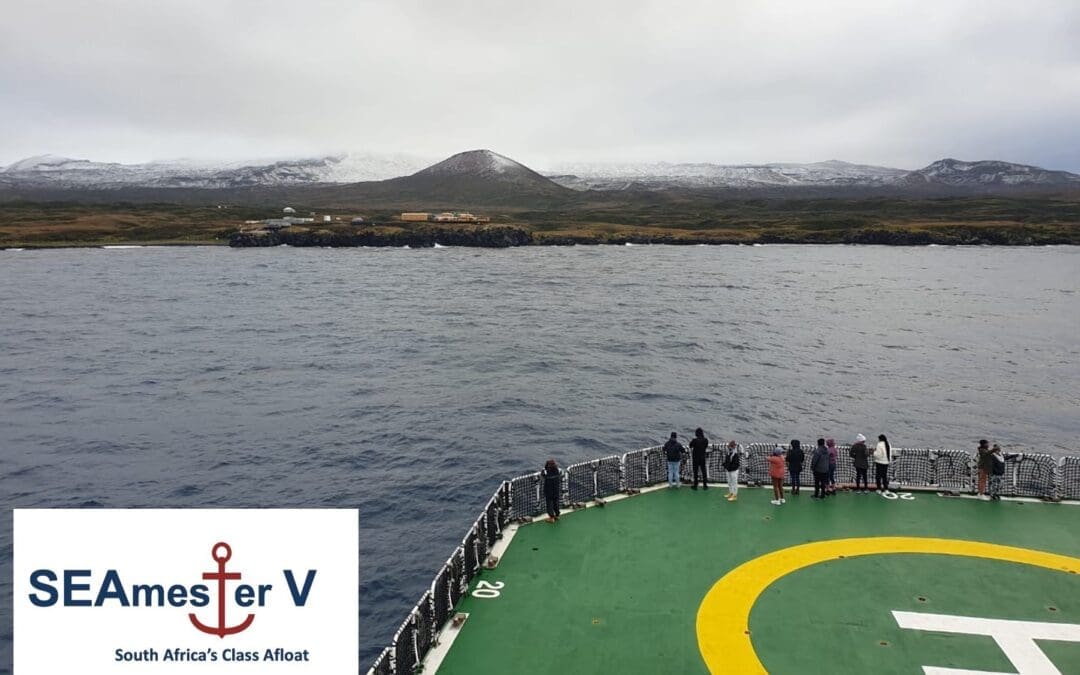



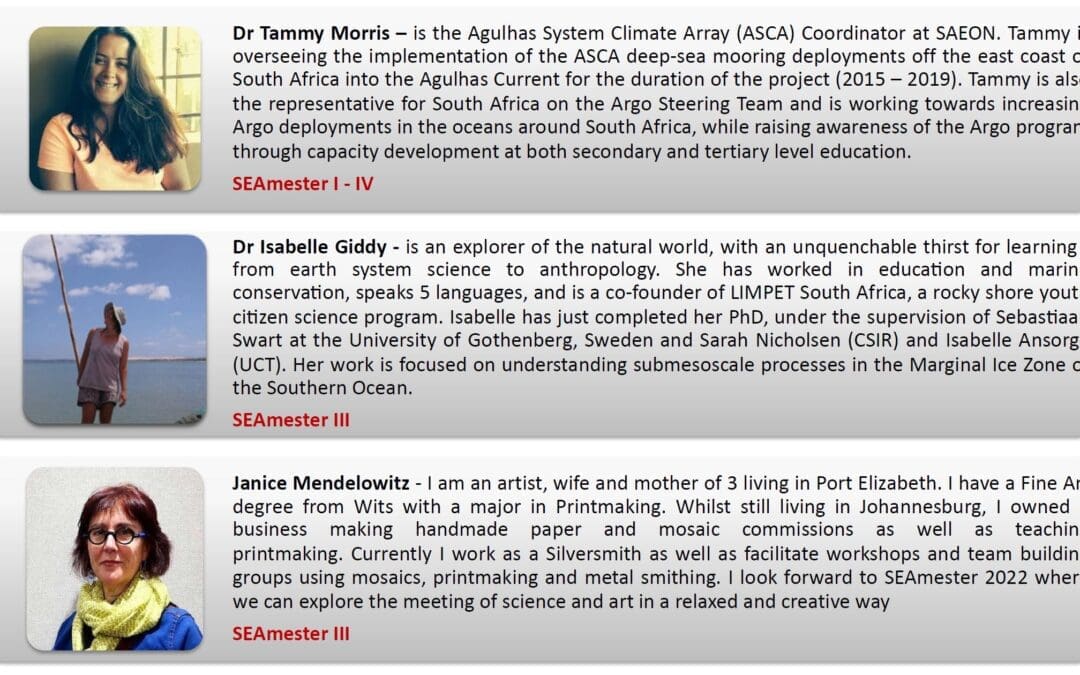
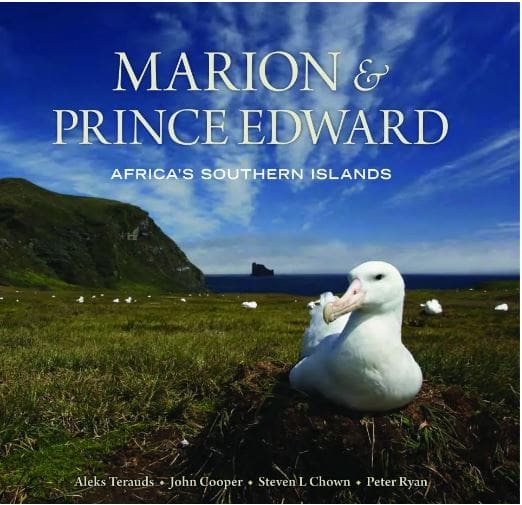
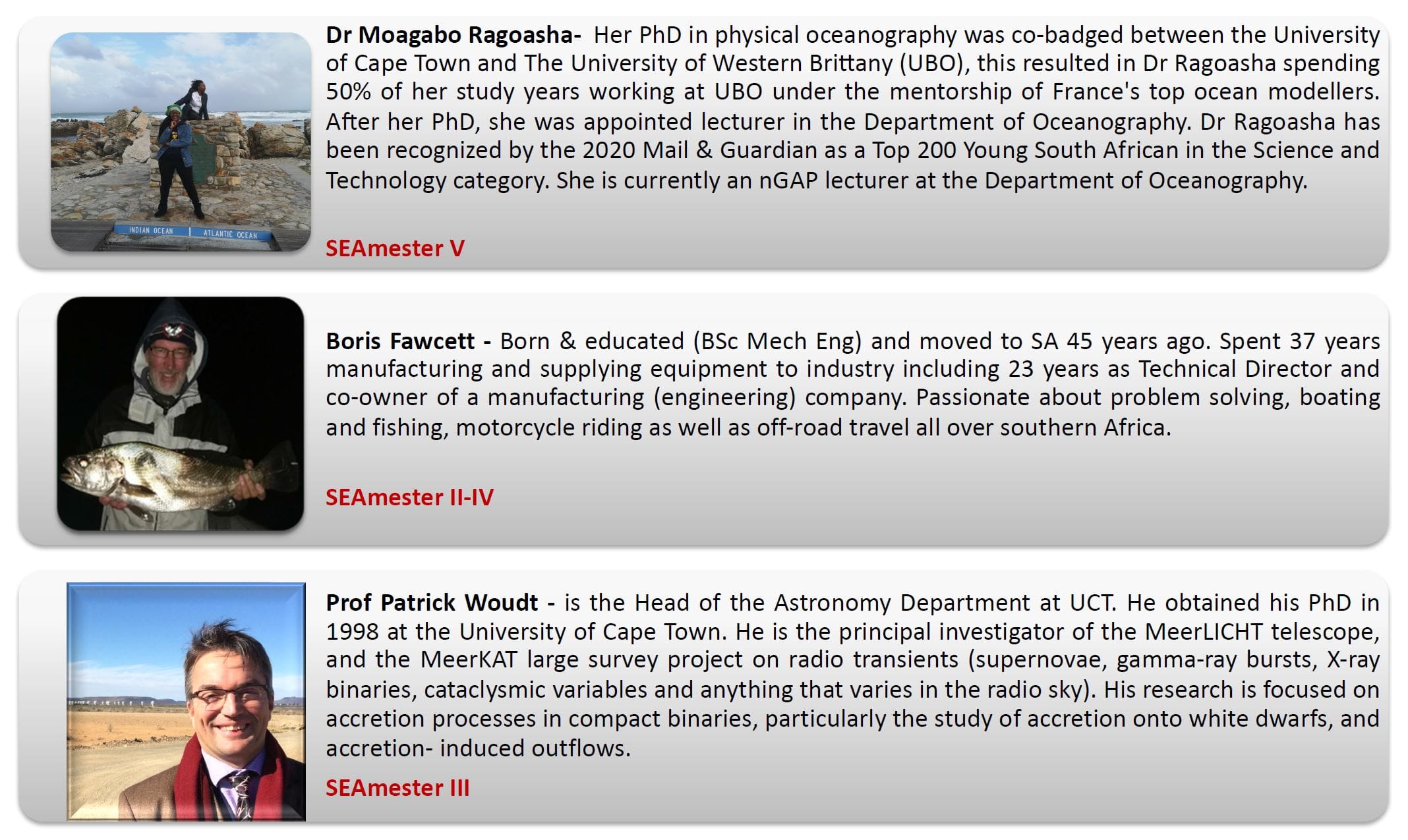
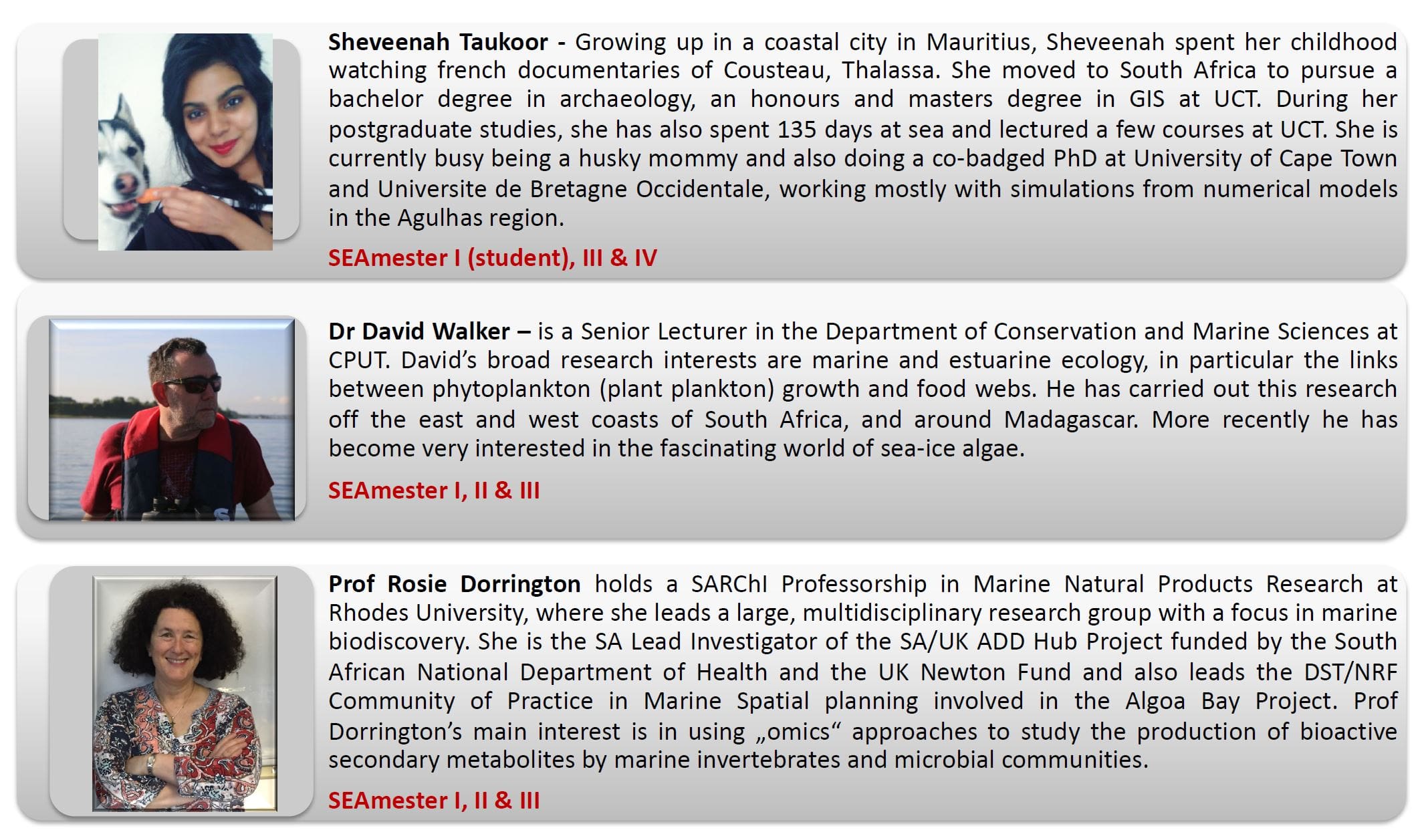
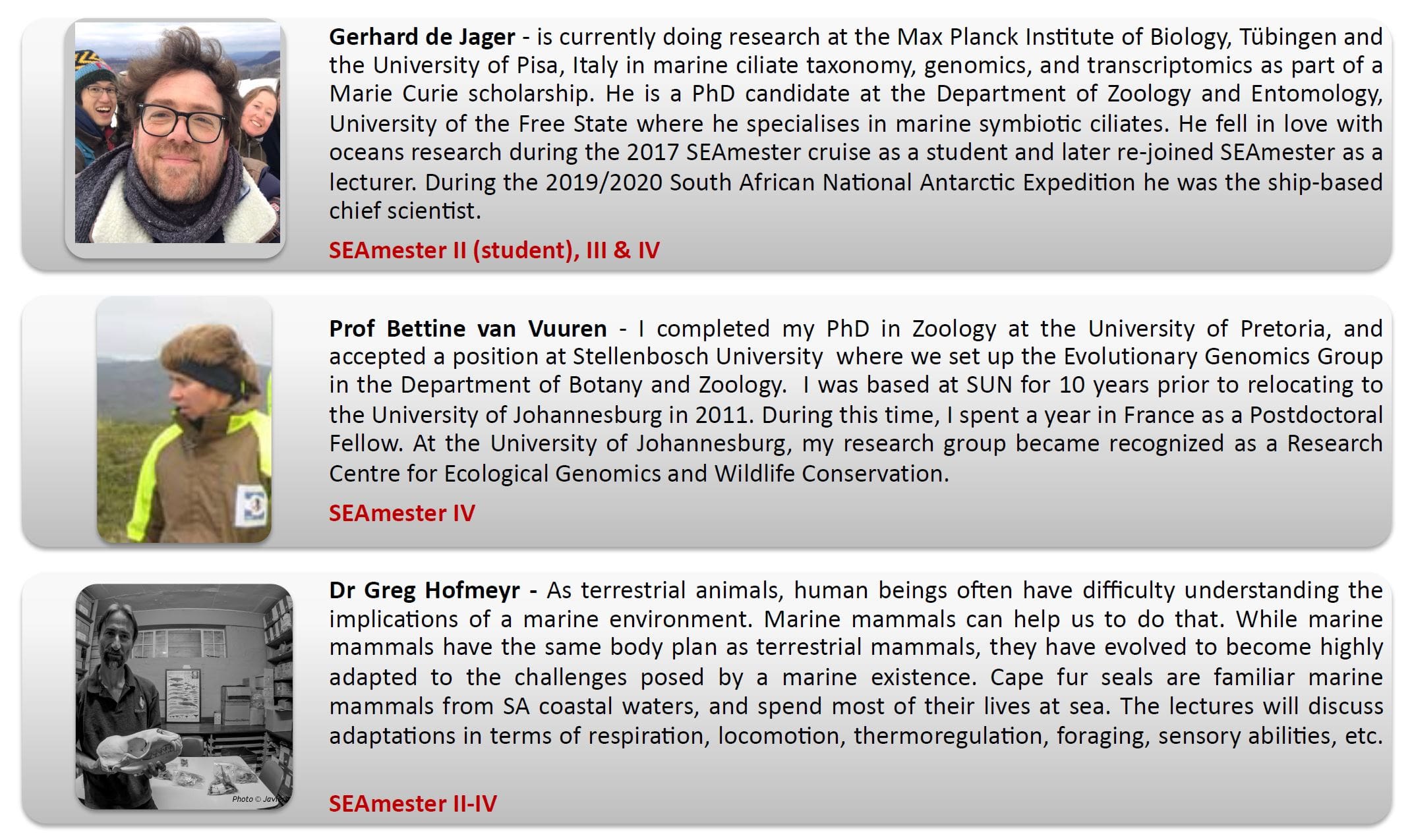
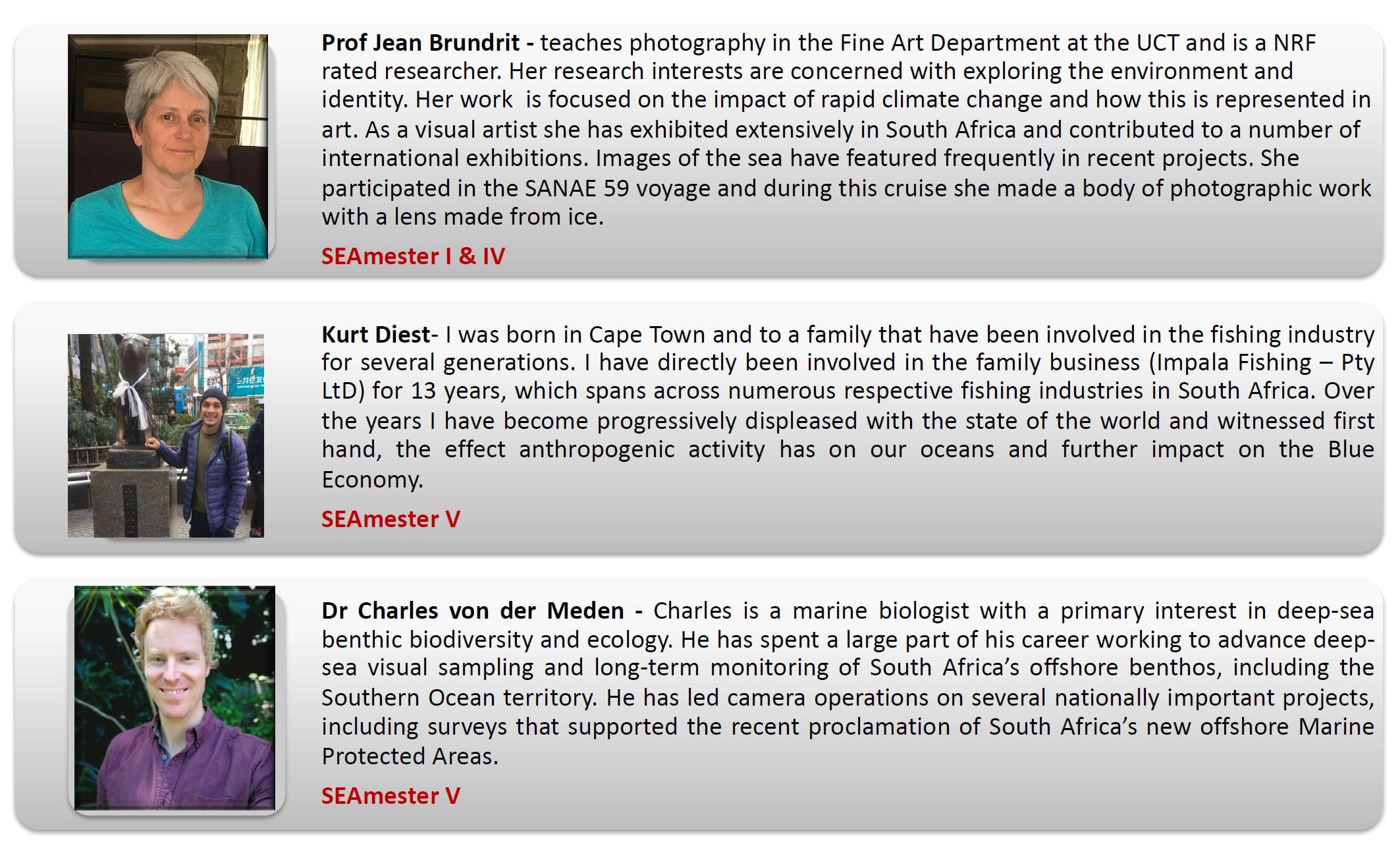
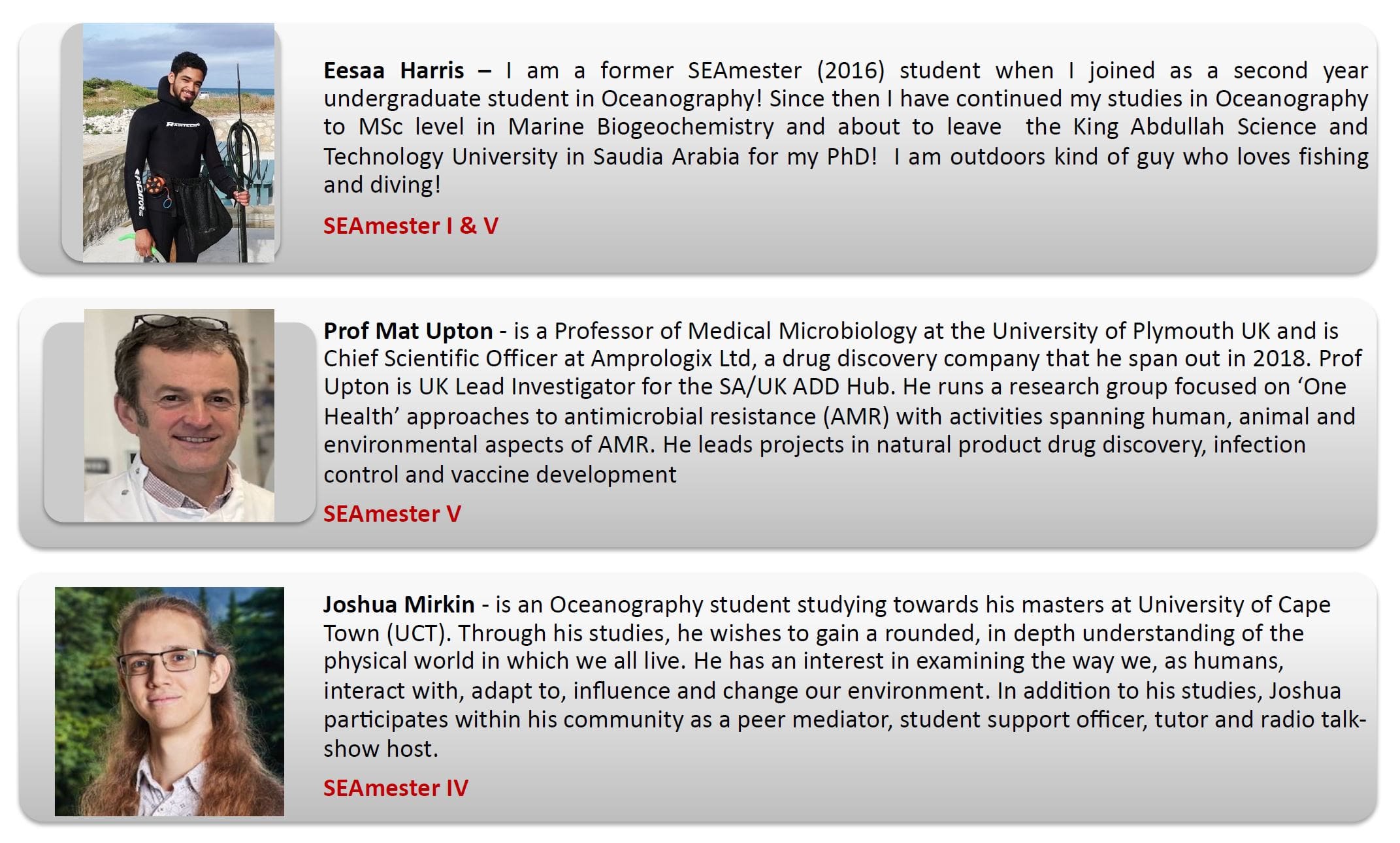
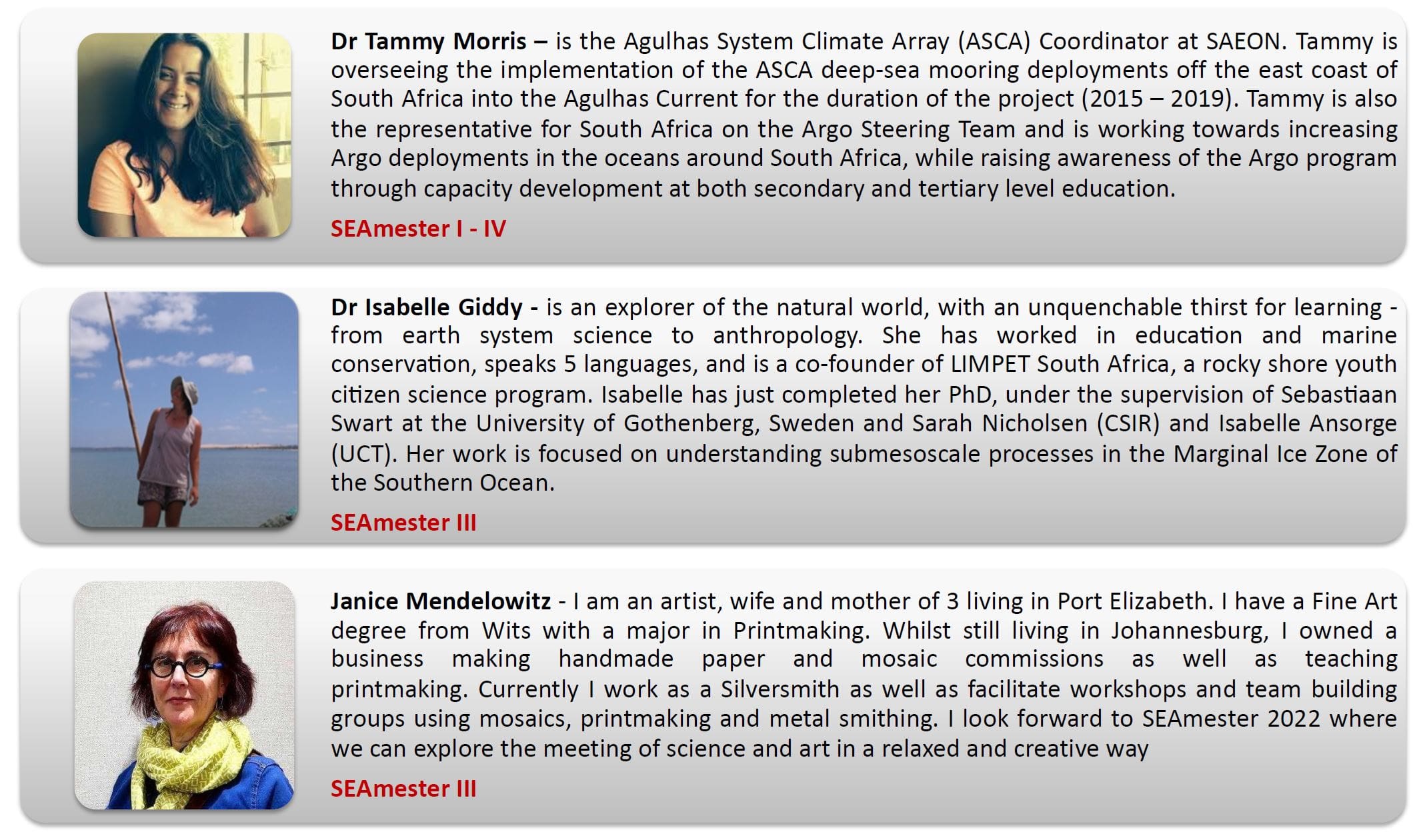
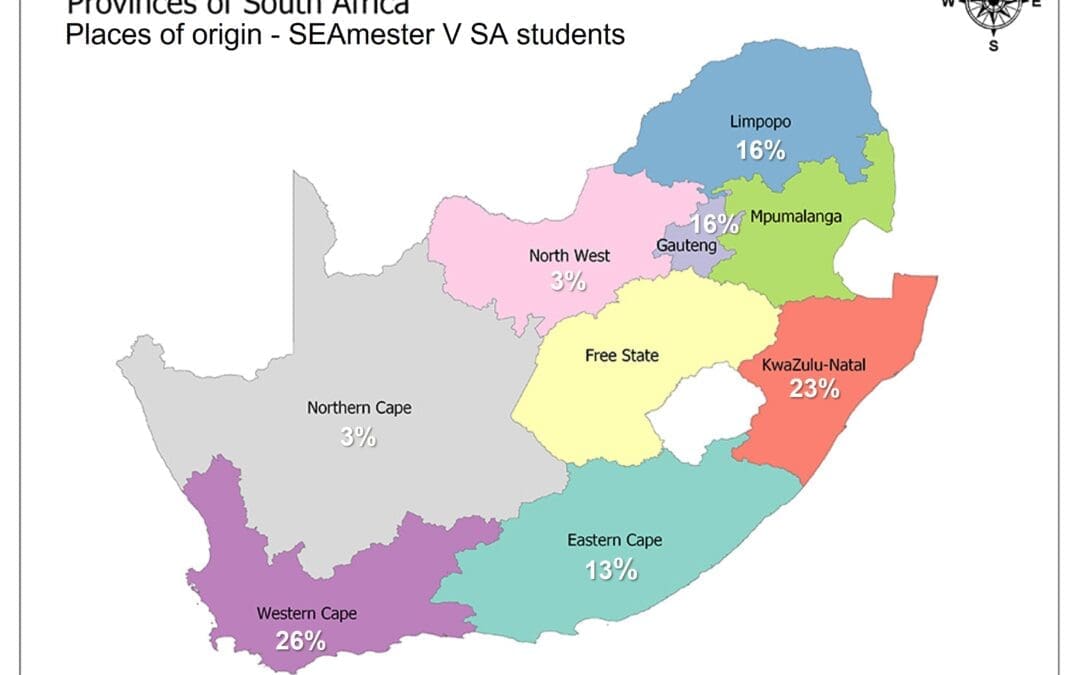
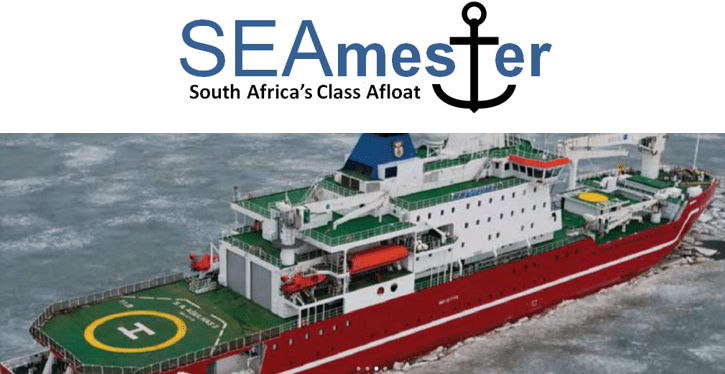


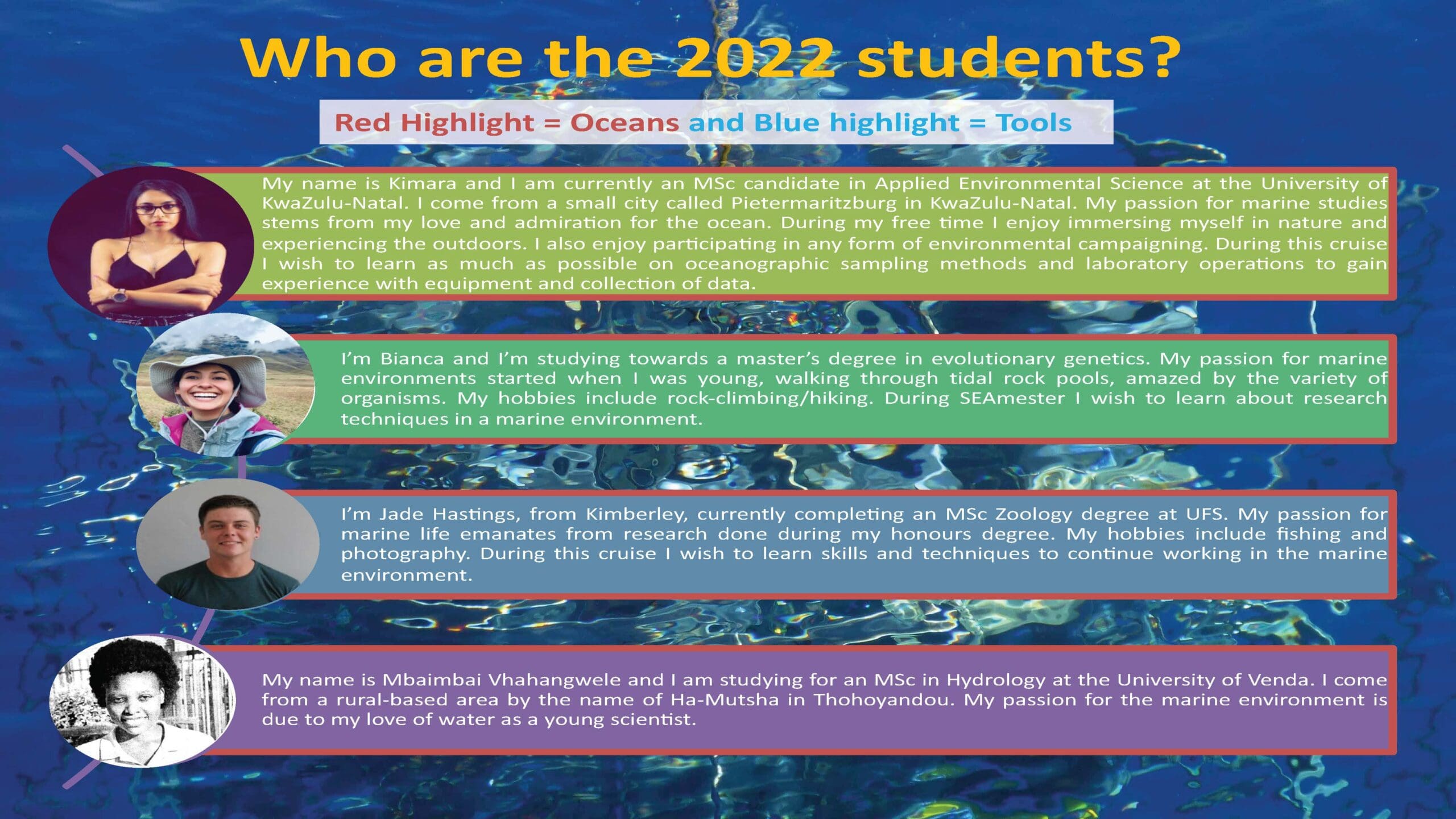
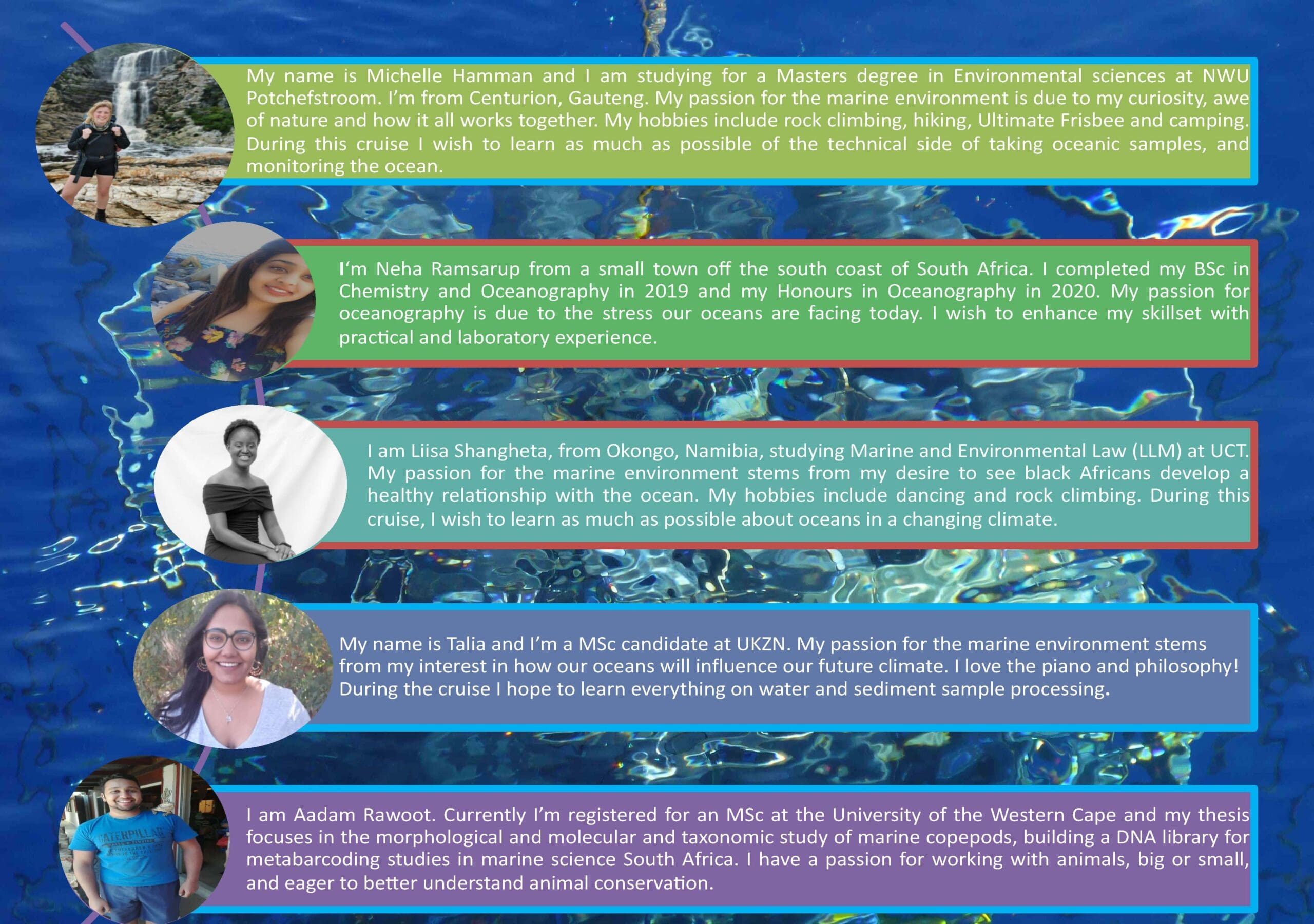
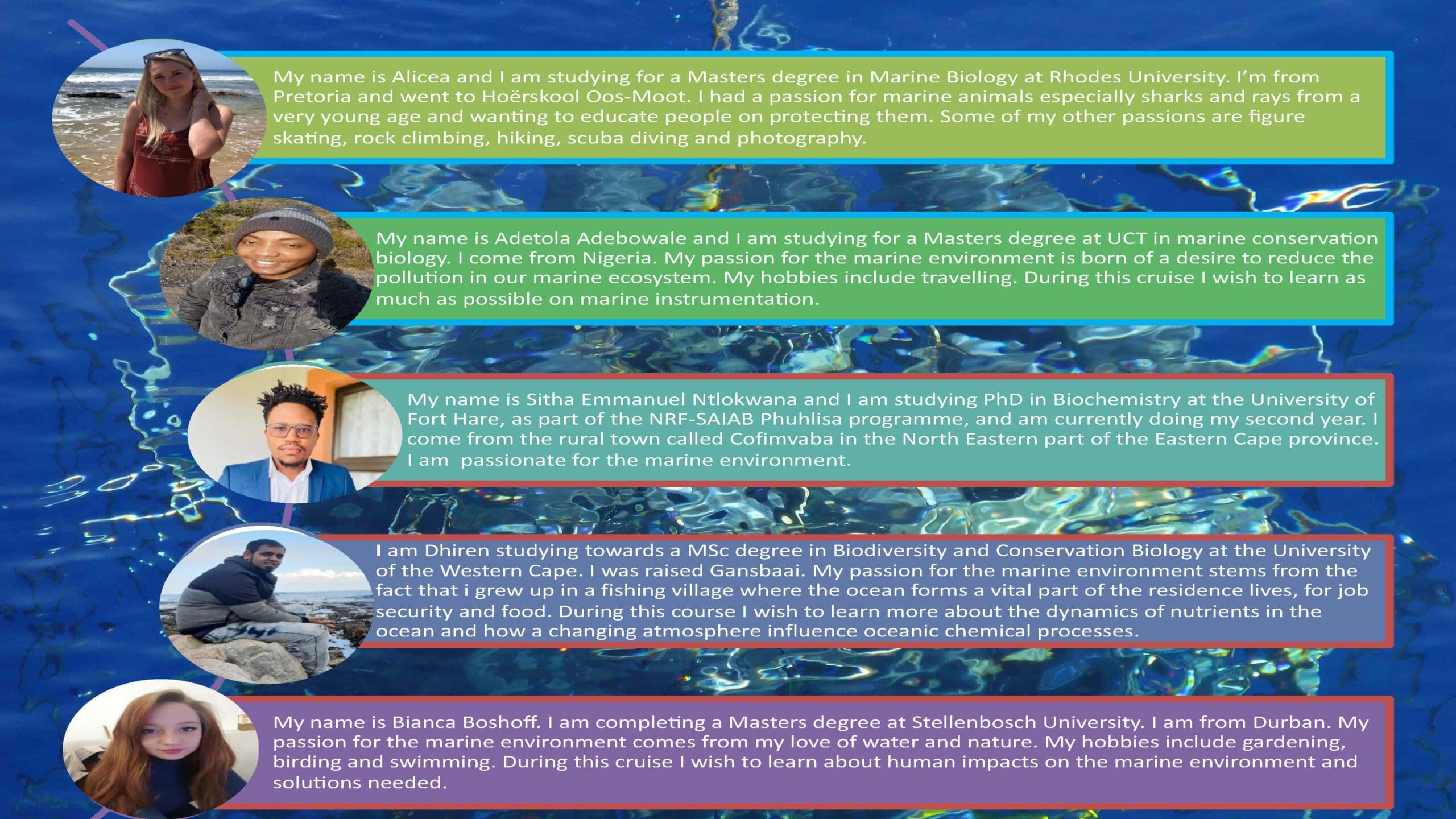
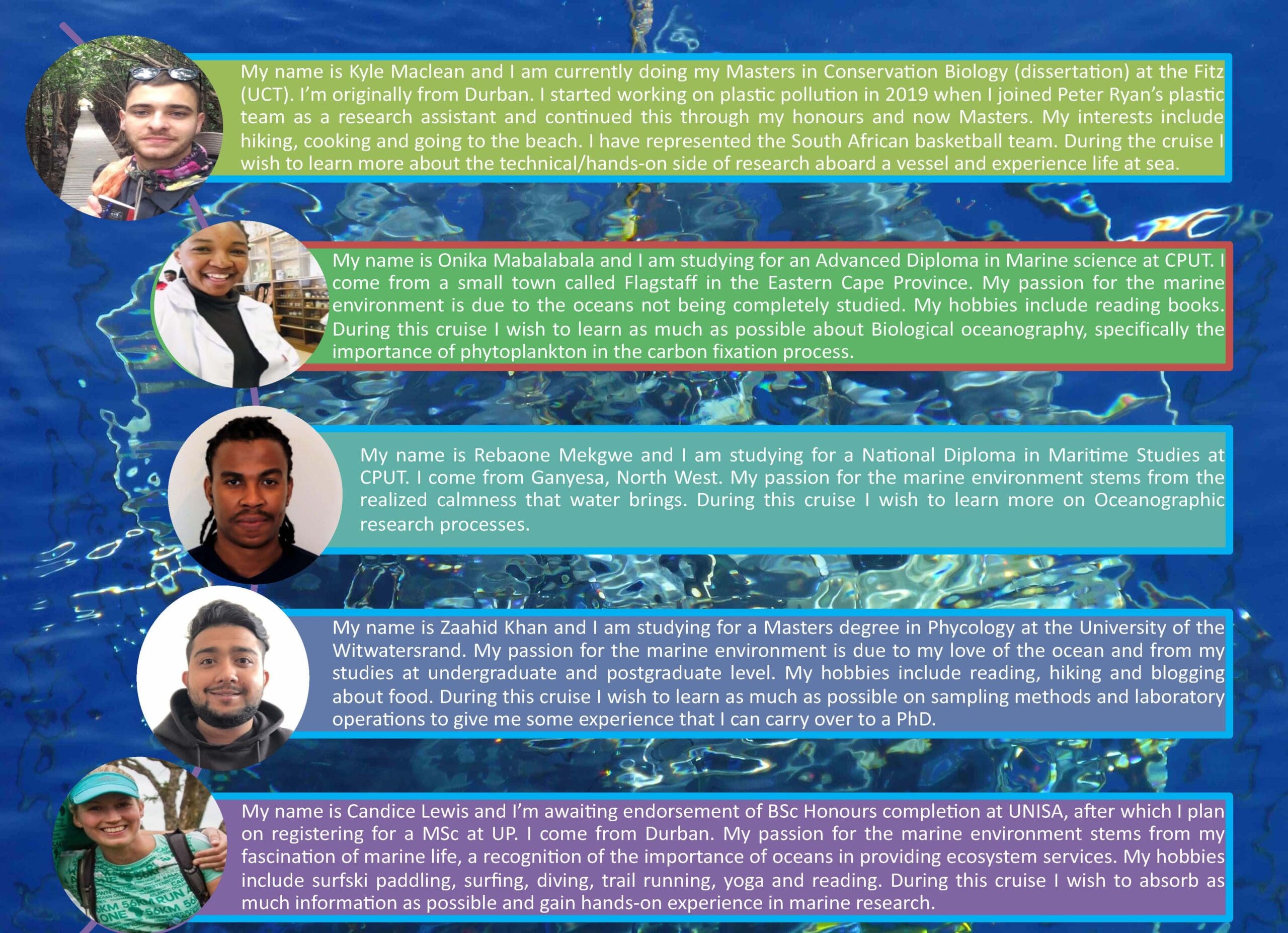
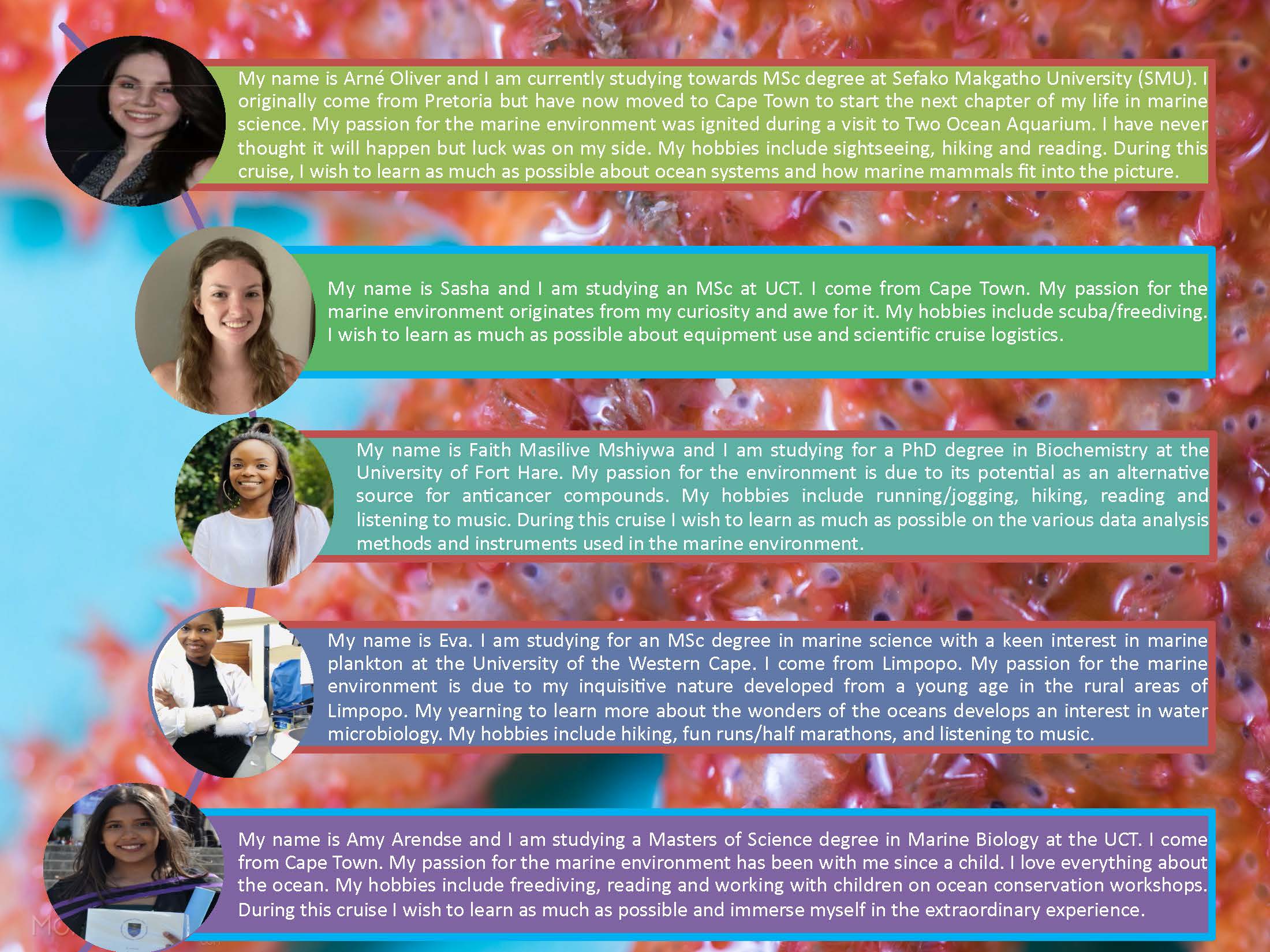
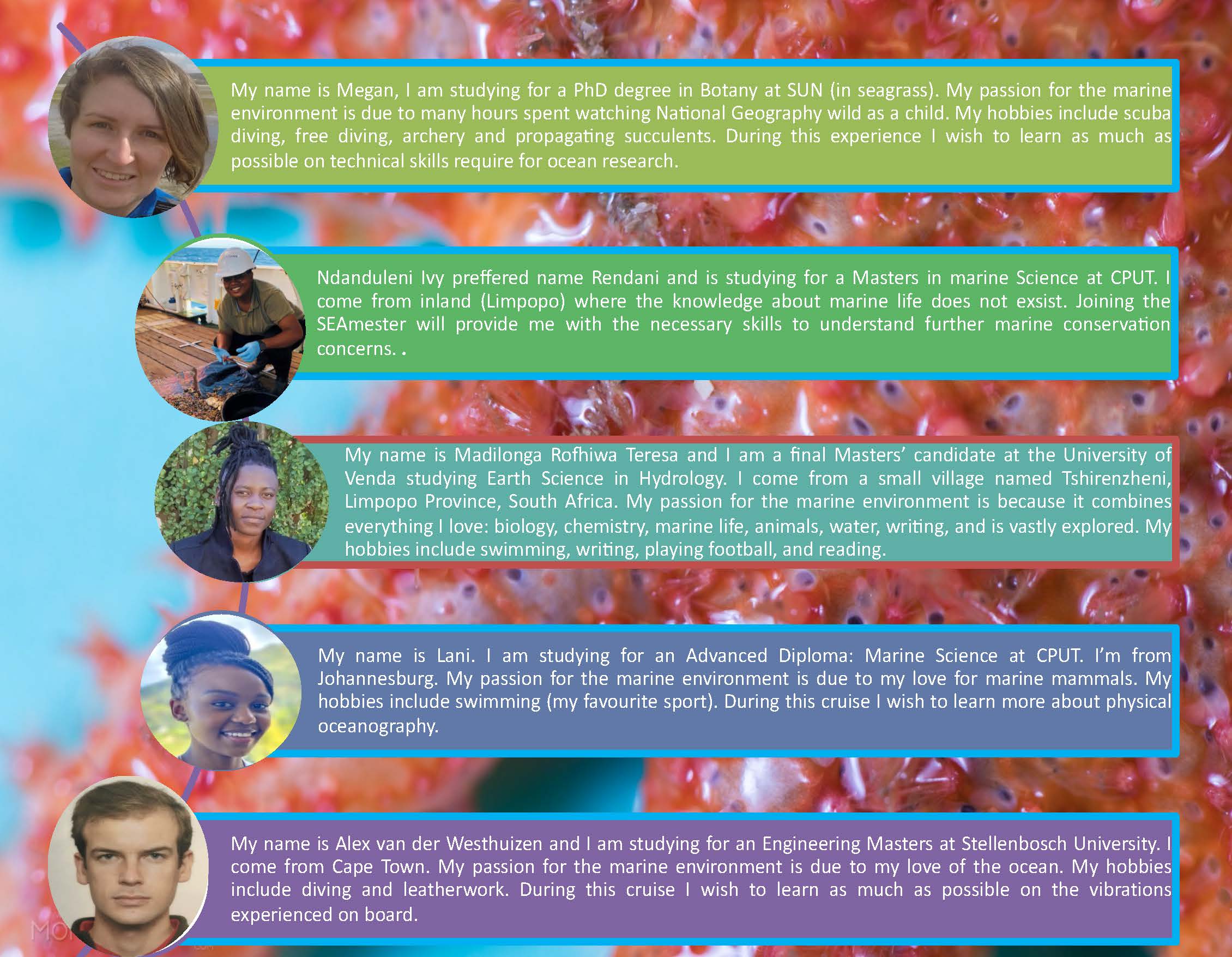
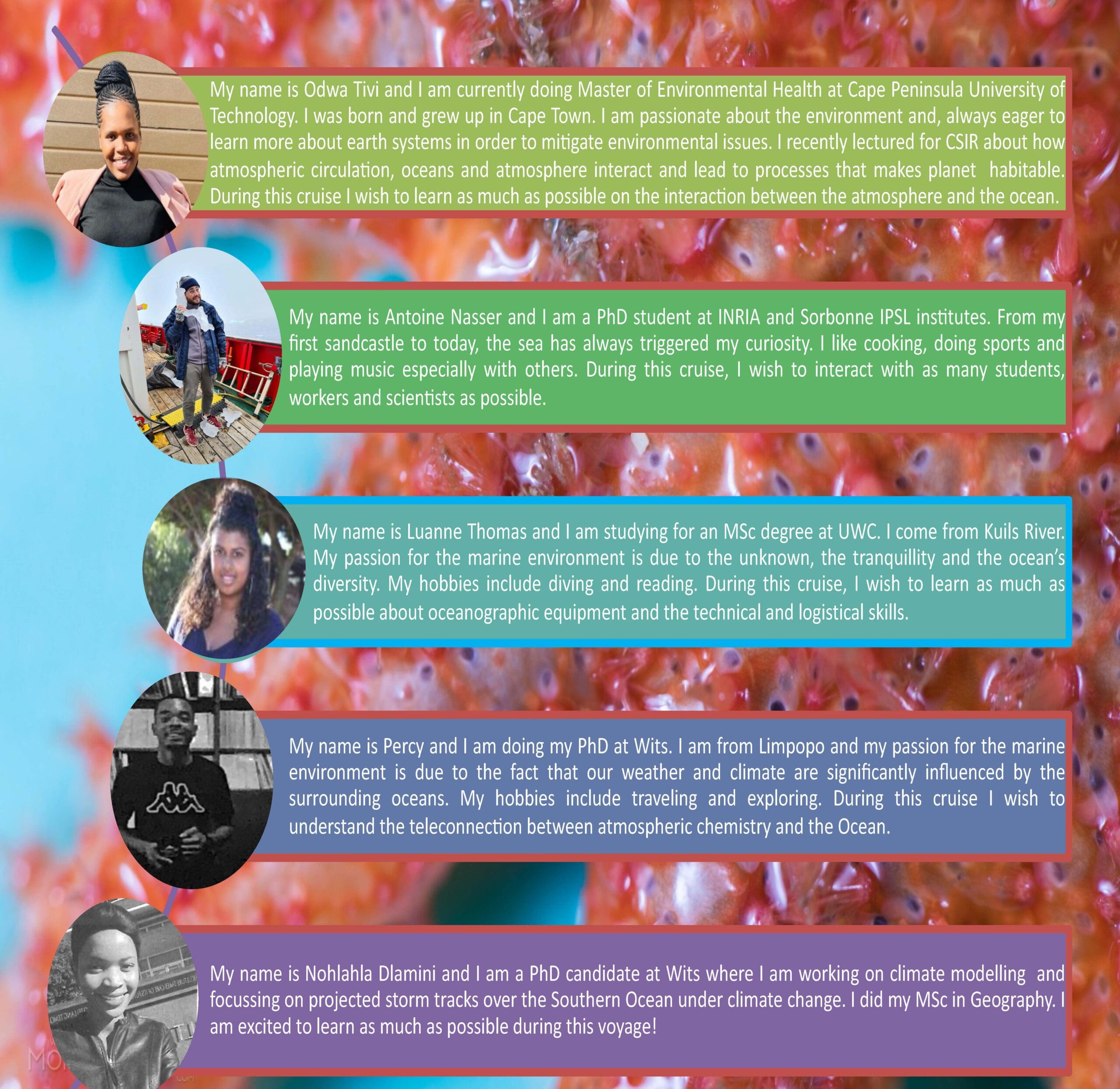
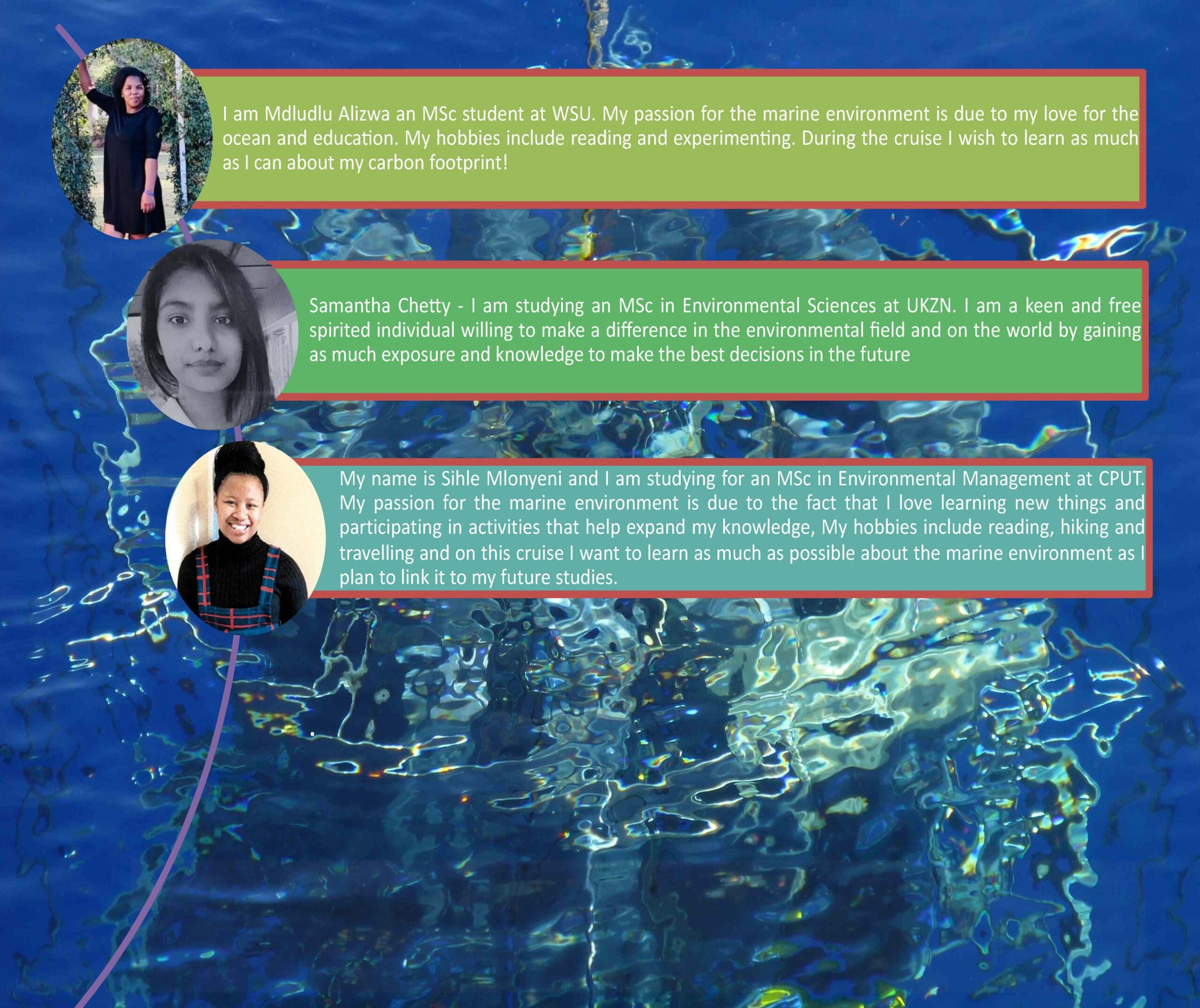

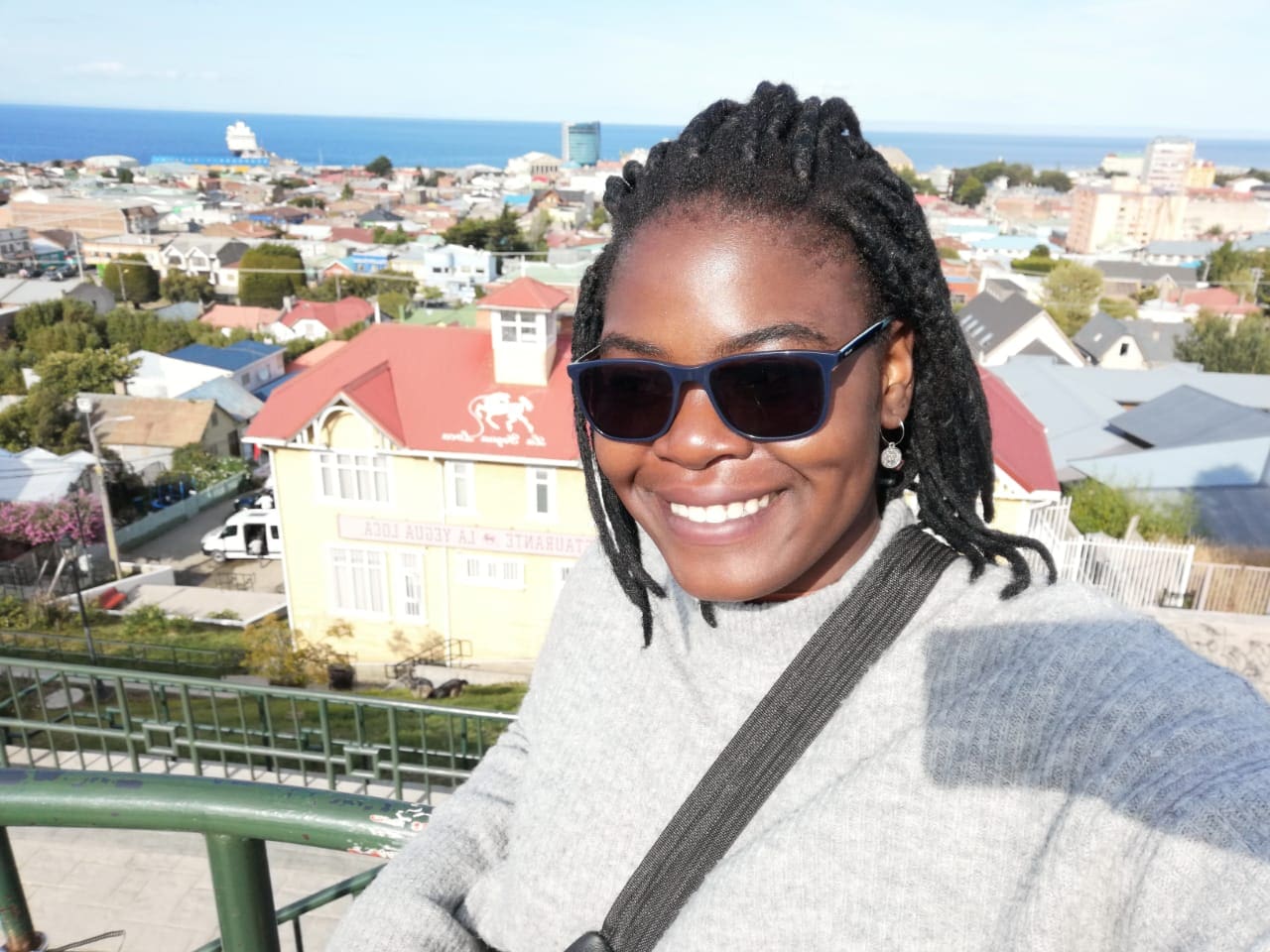
 Rudzani Silima (Rudzi) have from a young age, always known that she would pursue a career in environmental conservation and science. “I grew up in the very small town of
Rudzani Silima (Rudzi) have from a young age, always known that she would pursue a career in environmental conservation and science. “I grew up in the very small town of 
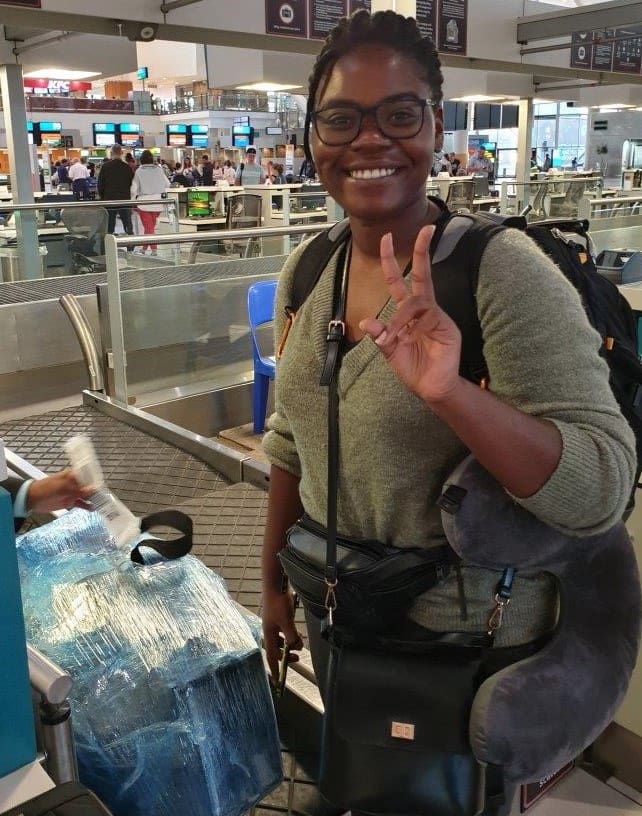

 (l-r: Rudzi and Nompumelelo(DEFF),weighing my luggage, Ria Olivier(ALSA) sent me on my trip, during transit I said goodbye to my family) To date I have attained a collection of prizes from my university and conferences, further validating my determination to advocate for the oceans and our planet. As the best
(l-r: Rudzi and Nompumelelo(DEFF),weighing my luggage, Ria Olivier(ALSA) sent me on my trip, during transit I said goodbye to my family) To date I have attained a collection of prizes from my university and conferences, further validating my determination to advocate for the oceans and our planet. As the best 
 The
The 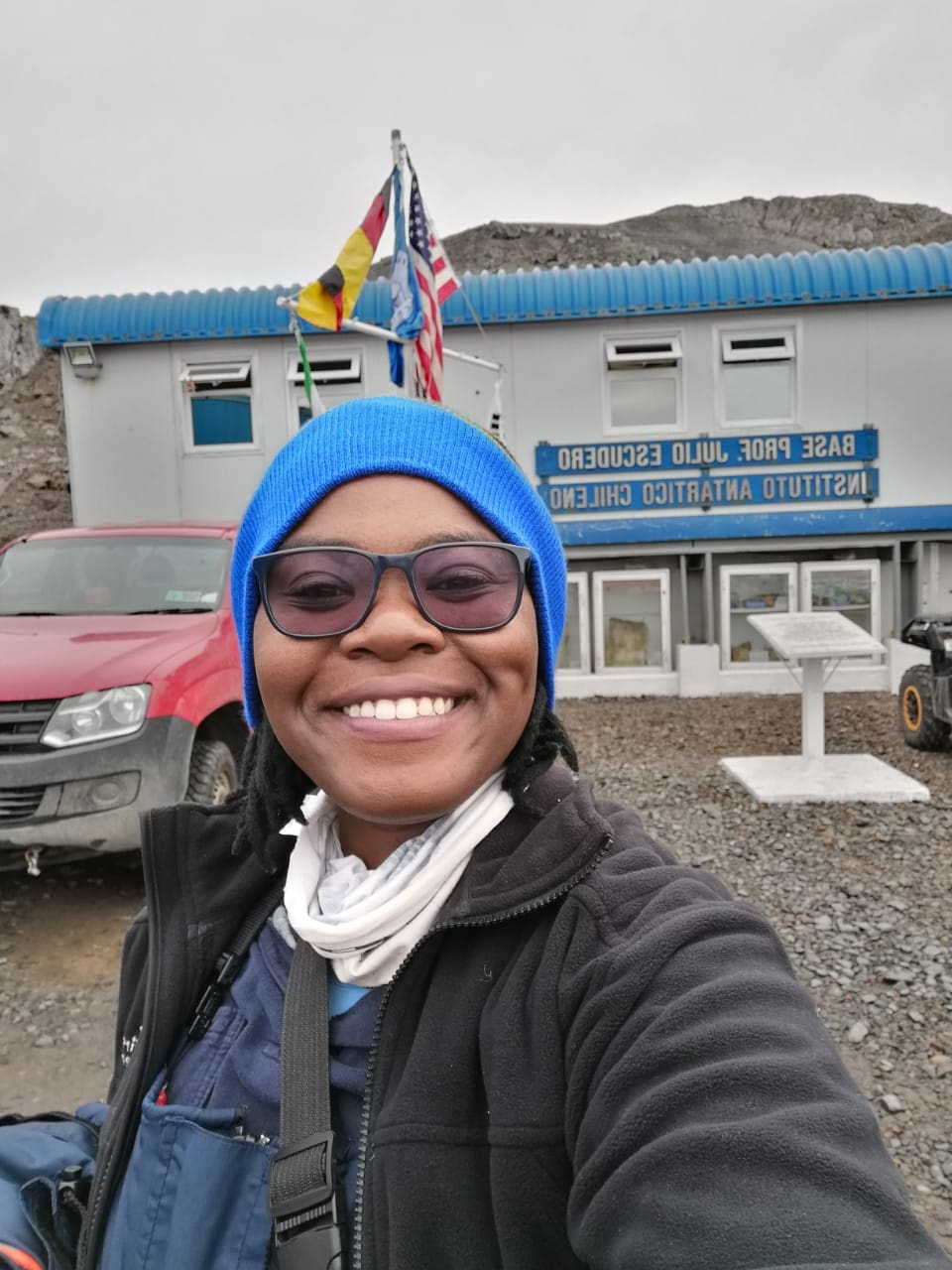
 There are many controversies related to climate change today, however, in Antarctica there is physical evidence that climate change is happening right now and not in some distant future. Therefore, the formation of the Antarctic Youth Coalition couldn’t be more perfectly timed. The AYC, hence from now on aims to make accessible the very important science done in the Southern Ocean to everyday citizens in the five gateway cities but also all around the world.
There are many controversies related to climate change today, however, in Antarctica there is physical evidence that climate change is happening right now and not in some distant future. Therefore, the formation of the Antarctic Youth Coalition couldn’t be more perfectly timed. The AYC, hence from now on aims to make accessible the very important science done in the Southern Ocean to everyday citizens in the five gateway cities but also all around the world.  “Therefore, all of us, common or otherwise, share the responsibility for a healthy, thriving Antarctica and our whole planet! My parting word, specifically to us young people is to never give up on yourself and never give up on your dreams. All of us have the potential to change the world in our own very unique and exciting ways”
“Therefore, all of us, common or otherwise, share the responsibility for a healthy, thriving Antarctica and our whole planet! My parting word, specifically to us young people is to never give up on yourself and never give up on your dreams. All of us have the potential to change the world in our own very unique and exciting ways”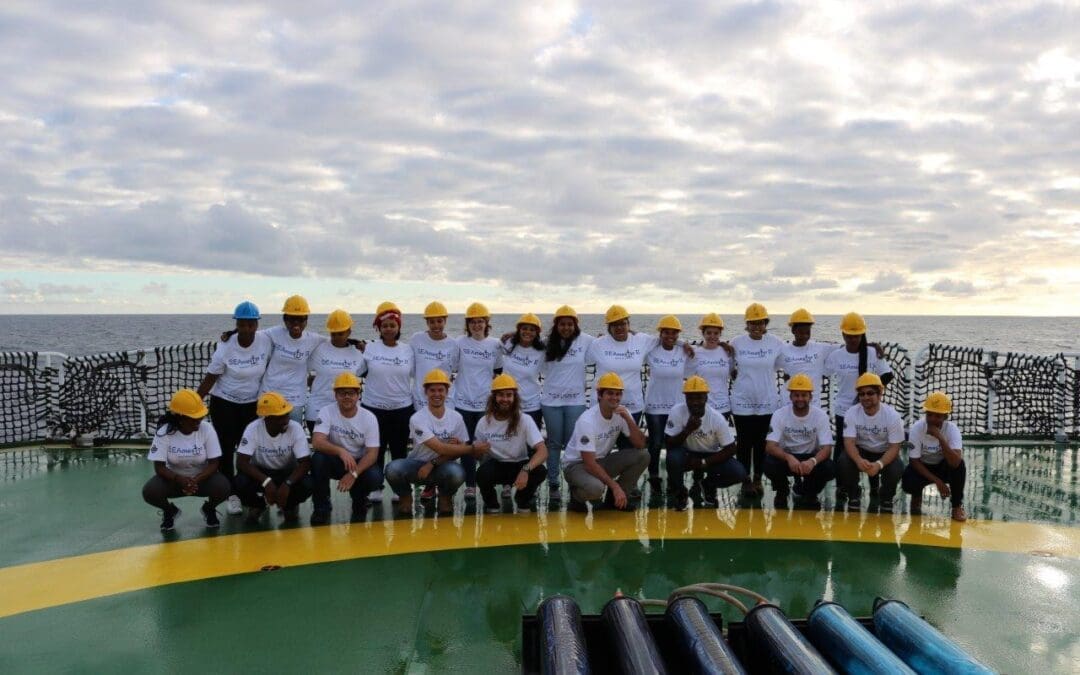
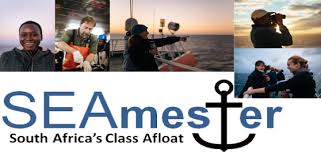

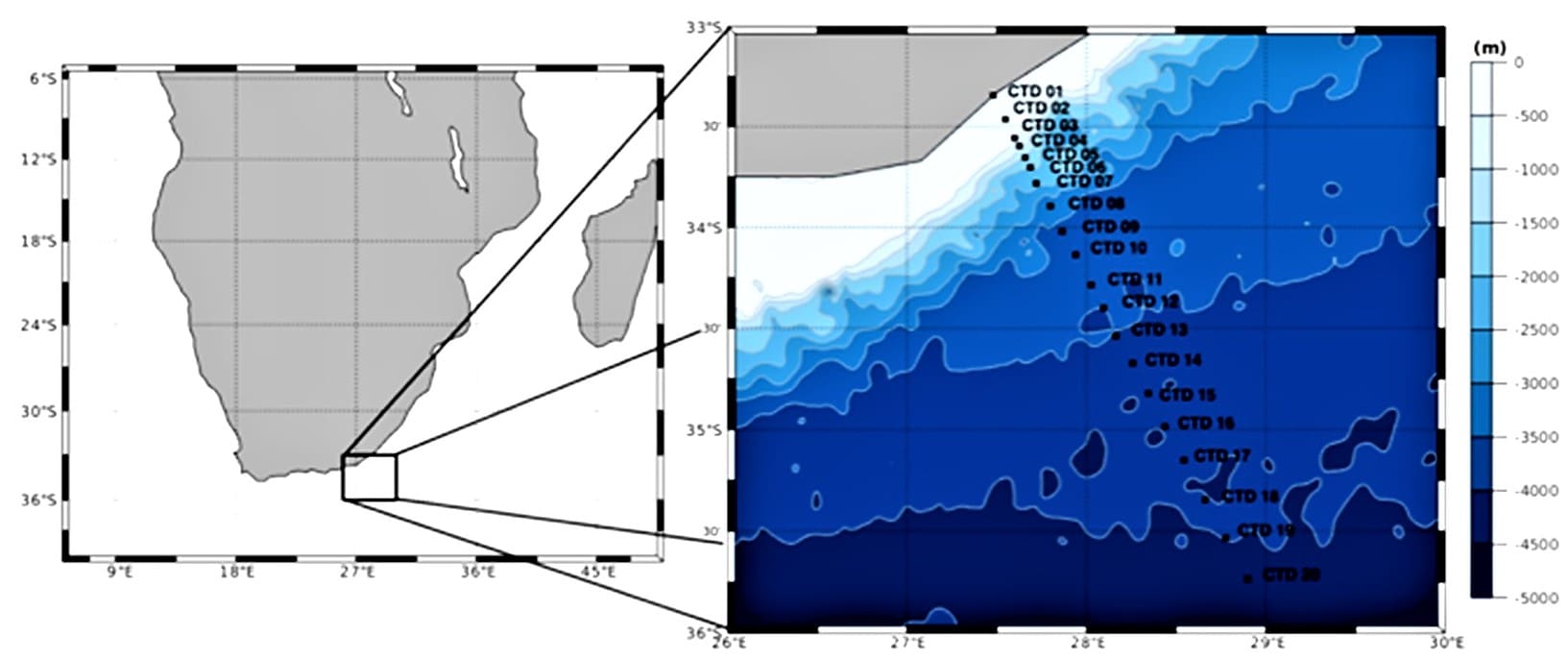 3 of the 4 previous SEAmester cruises have sampled the Agulhas System Climate Array (ASCA) transect. ASCA was an array of moorings deployed across the Agulhas Current from April 2016 to May 2018, in order to better understand the physical properties and dynamics of the Agulhas Current. The ASCA project extended the research undertaken along this array during the Agulhas Current Time-series project by continuing to sample the same 20 hydrographic stations. In-situ data in the Agulhas Current is very rare, and the collaborative, multi-disciplinary approach adopted during SEAmester has greatly improved our understanding of the complex Agulhas Current System. More information in paper by
3 of the 4 previous SEAmester cruises have sampled the Agulhas System Climate Array (ASCA) transect. ASCA was an array of moorings deployed across the Agulhas Current from April 2016 to May 2018, in order to better understand the physical properties and dynamics of the Agulhas Current. The ASCA project extended the research undertaken along this array during the Agulhas Current Time-series project by continuing to sample the same 20 hydrographic stations. In-situ data in the Agulhas Current is very rare, and the collaborative, multi-disciplinary approach adopted during SEAmester has greatly improved our understanding of the complex Agulhas Current System. More information in paper by 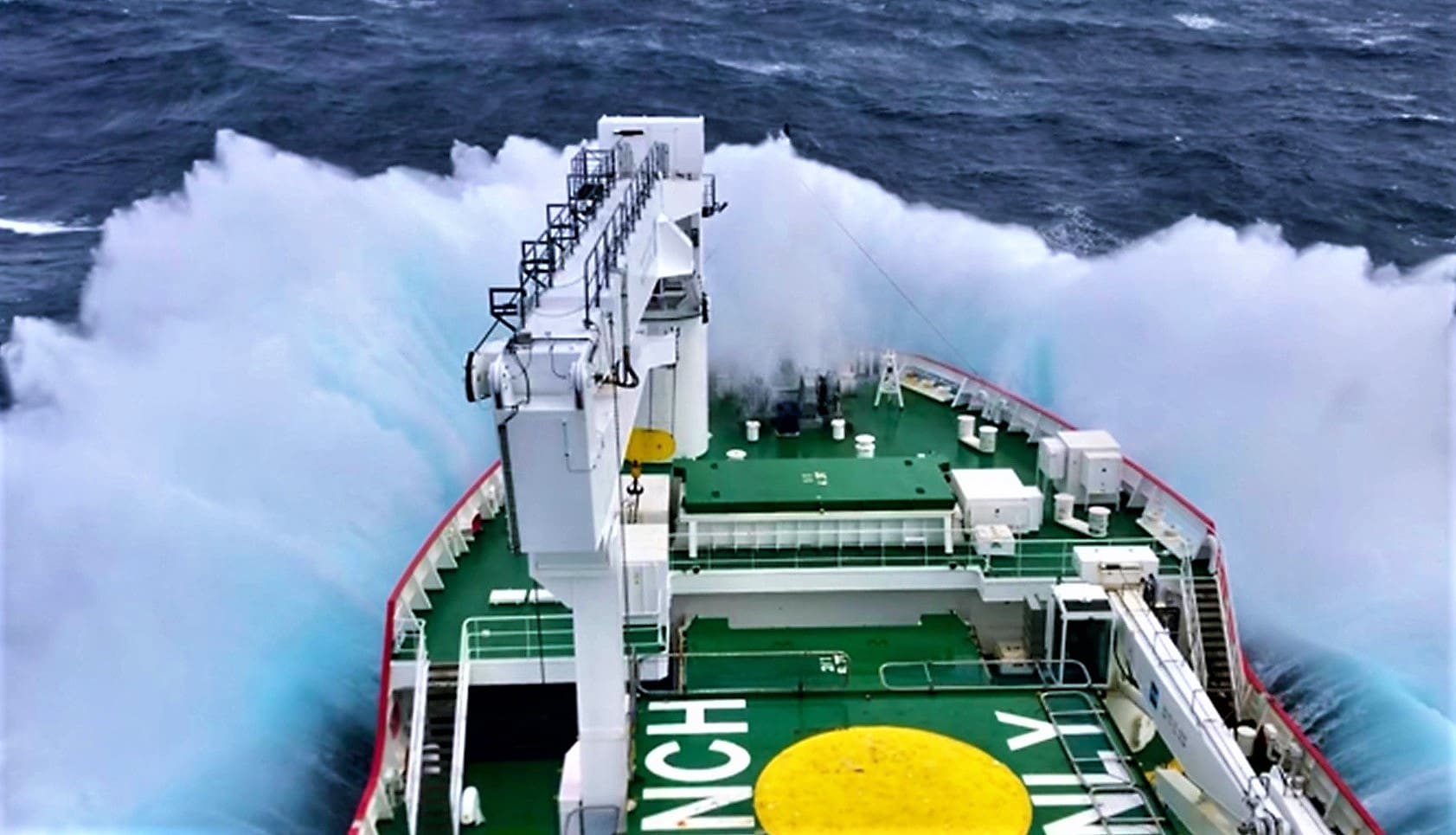 Left: Last year during SEAmester IV we experienced 3 consecutive cold fronts with resulting waves of up to 10m in size. This rough weather meant we were only able to sample 16 out of 20 of our planned stations. Photo credit: Thando Mazomba
Left: Last year during SEAmester IV we experienced 3 consecutive cold fronts with resulting waves of up to 10m in size. This rough weather meant we were only able to sample 16 out of 20 of our planned stations. Photo credit: Thando Mazomba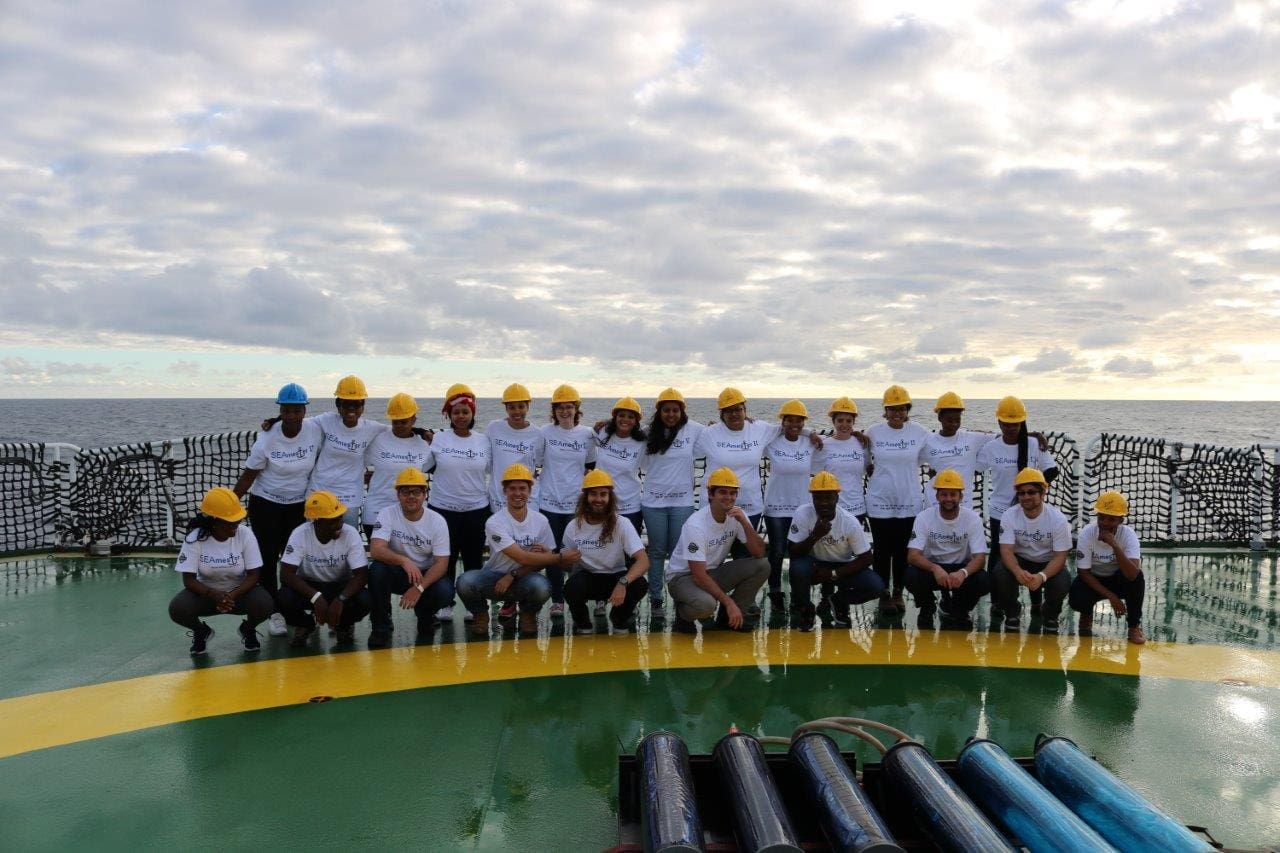 SEAmester has changed the lives of students! “
SEAmester has changed the lives of students! “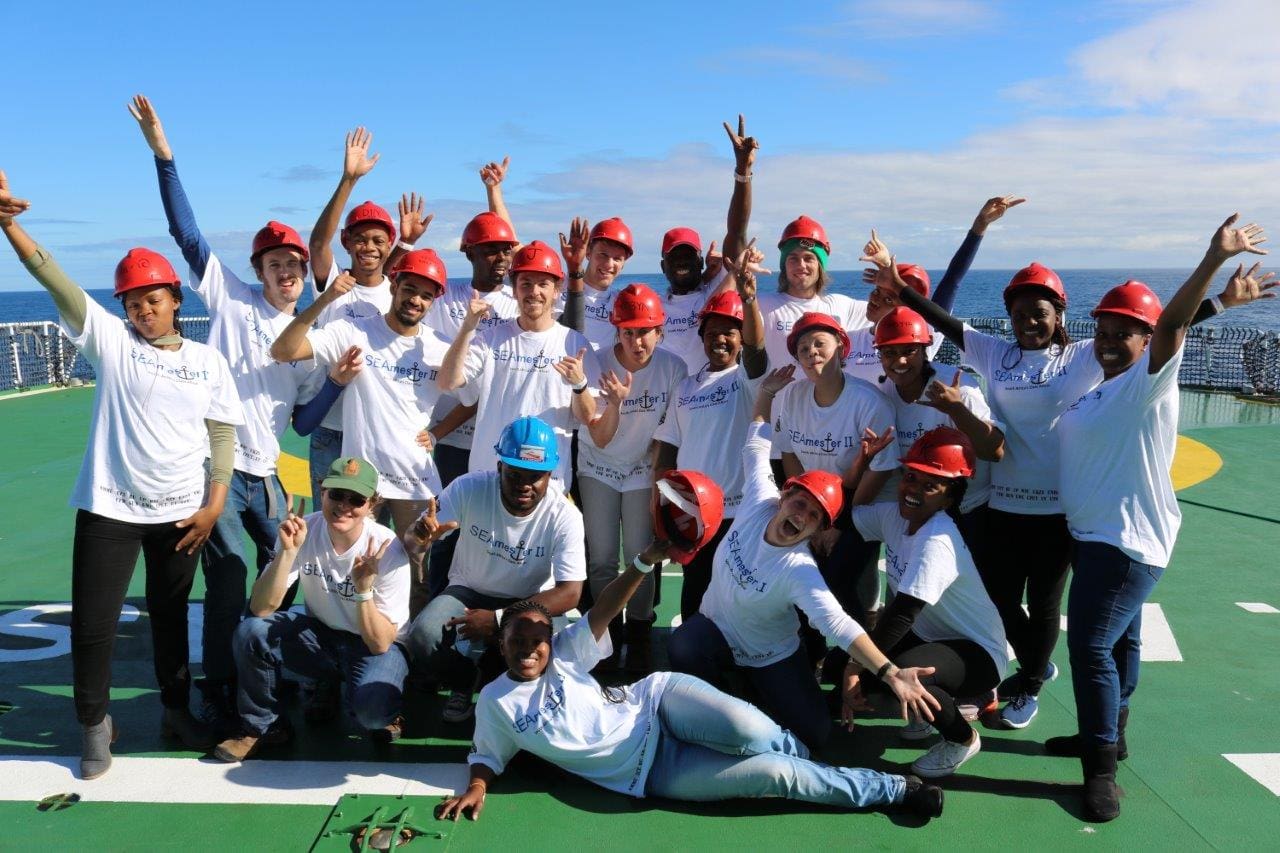
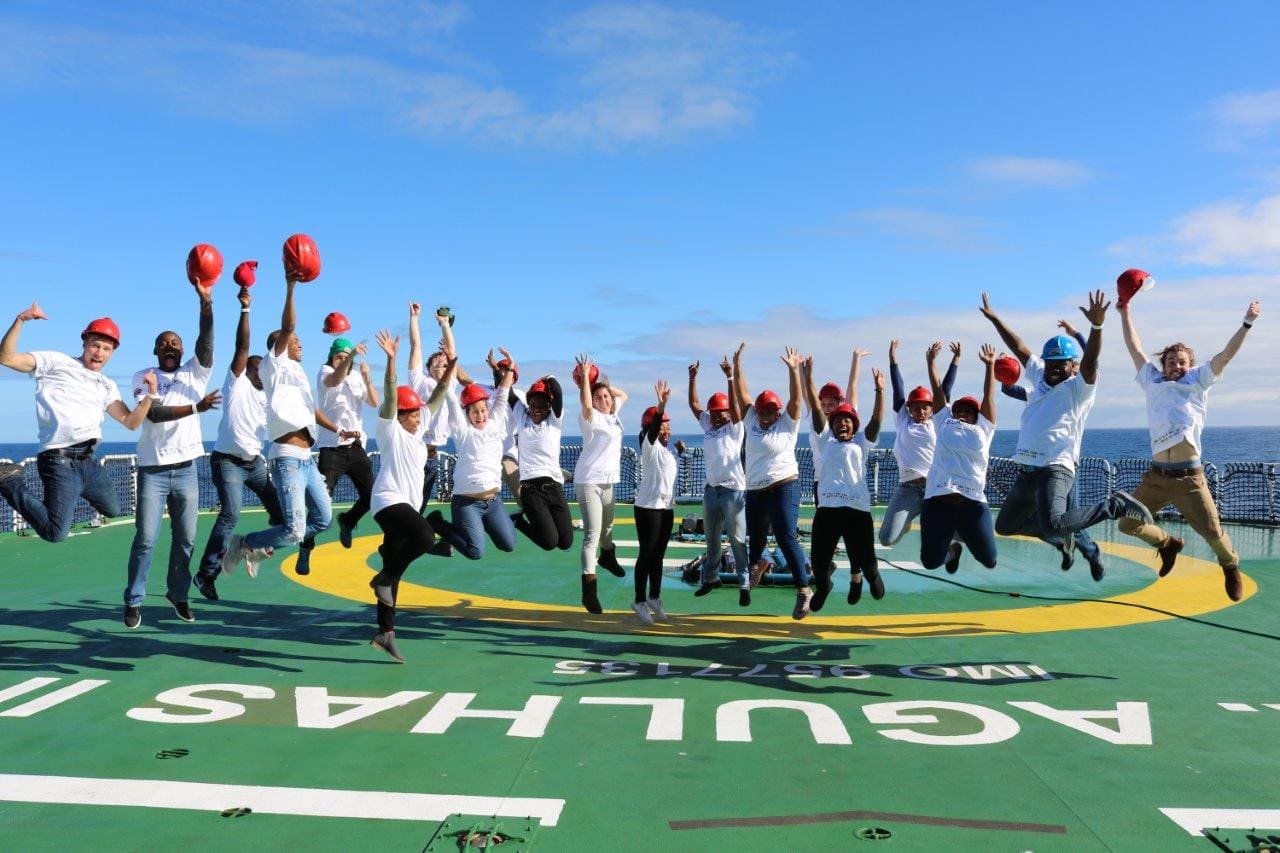 Text Supplied by Laura Braby – SAEON- Egagasini Node. Student Comments supplied by Isabelle Ansorge. Images available on
Text Supplied by Laura Braby – SAEON- Egagasini Node. Student Comments supplied by Isabelle Ansorge. Images available on 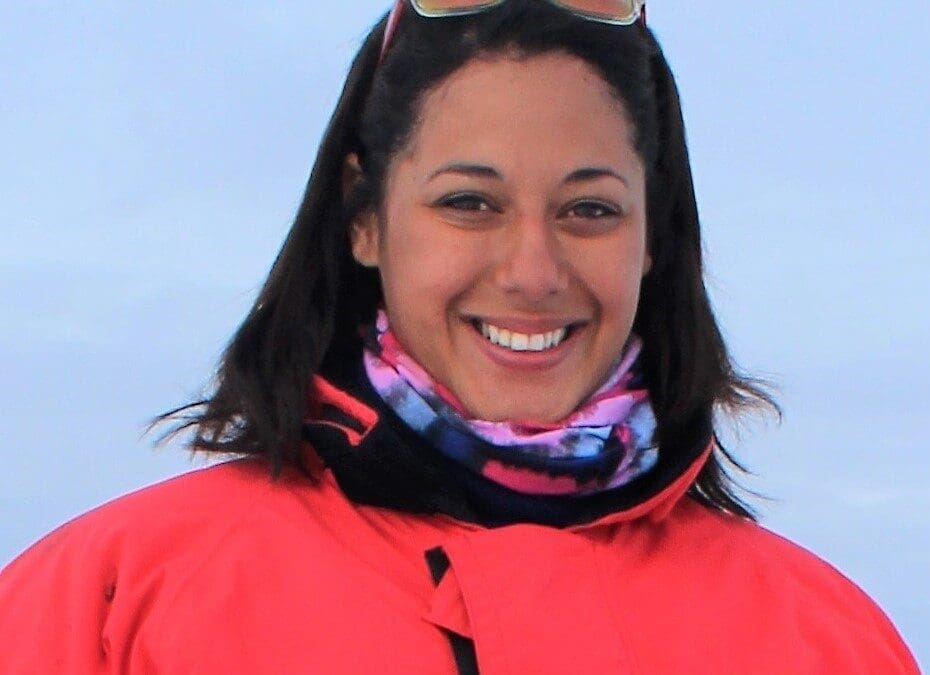
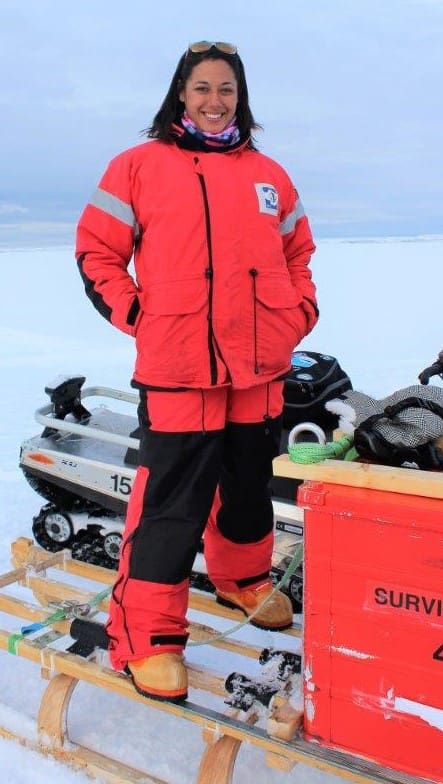 Where did it all started for Tahlia: “From an early age I have had an unbridled passion for the ocean and understanding technology, which led me to pursue my studies in Oceanography at the Cape Peninsula University of Technology (CPUT). I chose to study here as it provided a platform to not only gain academic experience within an oceanographic context, but to also gain field experience. In my third year (2014) I was placed at Bayworld Centre of Research and Education (BCRE) in order to complete a number of research projects which spanned across an array of oceanographic disciplines, namely: Marine Instrumentation, Marine Resource Management, Ocean Sciences and Marine Outreach. This placement exposed me to the different aspects of oceanography and allowed me to find my particular field of interest. It was there, at BCRE, that I was exposed to physical oceanography, data processing and development of marine instrumentation. I knew that I had found my niche within the oceanographic community and would strive to further my education, work experience and continue to learn and grow within this sector. After earning a National Diploma, I completed a BTech degree where I continued to work part-time at BCRE and develop my final research project. This project focused on the development of two sub-sea moorings, each housing a 75 kHz Acoustic Doppler Current Profiler (ADCP), which I was fortunate enough to deploy between two sub-Antarctic Islands—Marion Island and Prince Edward Island—while aboard the research vessel, SA Agulhas II.
Where did it all started for Tahlia: “From an early age I have had an unbridled passion for the ocean and understanding technology, which led me to pursue my studies in Oceanography at the Cape Peninsula University of Technology (CPUT). I chose to study here as it provided a platform to not only gain academic experience within an oceanographic context, but to also gain field experience. In my third year (2014) I was placed at Bayworld Centre of Research and Education (BCRE) in order to complete a number of research projects which spanned across an array of oceanographic disciplines, namely: Marine Instrumentation, Marine Resource Management, Ocean Sciences and Marine Outreach. This placement exposed me to the different aspects of oceanography and allowed me to find my particular field of interest. It was there, at BCRE, that I was exposed to physical oceanography, data processing and development of marine instrumentation. I knew that I had found my niche within the oceanographic community and would strive to further my education, work experience and continue to learn and grow within this sector. After earning a National Diploma, I completed a BTech degree where I continued to work part-time at BCRE and develop my final research project. This project focused on the development of two sub-sea moorings, each housing a 75 kHz Acoustic Doppler Current Profiler (ADCP), which I was fortunate enough to deploy between two sub-Antarctic Islands—Marion Island and Prince Edward Island—while aboard the research vessel, SA Agulhas II.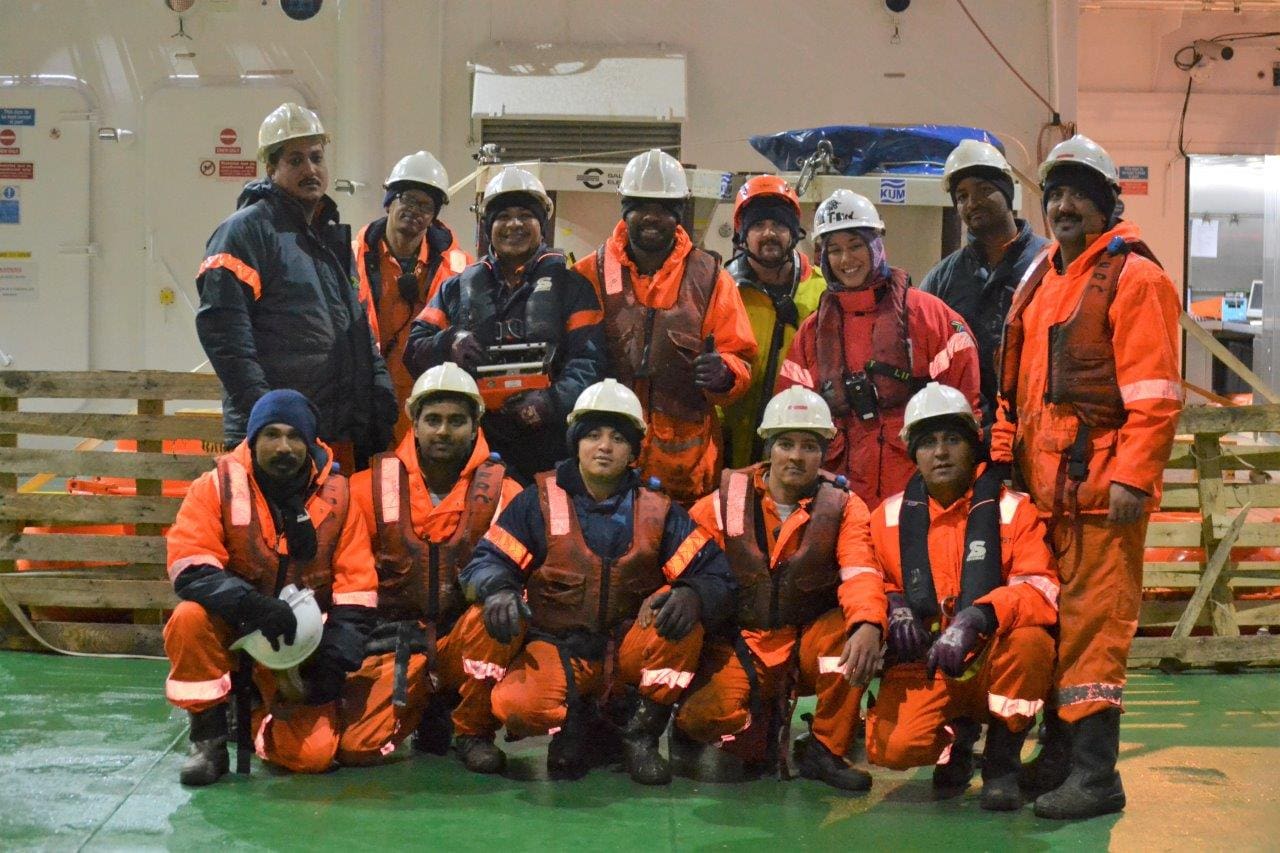
 Following the completion of my BTech degree, I continued to work on this mooring data over the next four years, returning to Marion Island and ensuring the safe retrieval and re-deployment of the sub-sea moorings. The data collected formulated the basis of my MSc research project, entitled Impact of ocean variability on Shelf-Seas surrounding the sub-Antarctic Prince Edward Islands.
Following the completion of my BTech degree, I continued to work on this mooring data over the next four years, returning to Marion Island and ensuring the safe retrieval and re-deployment of the sub-sea moorings. The data collected formulated the basis of my MSc research project, entitled Impact of ocean variability on Shelf-Seas surrounding the sub-Antarctic Prince Edward Islands.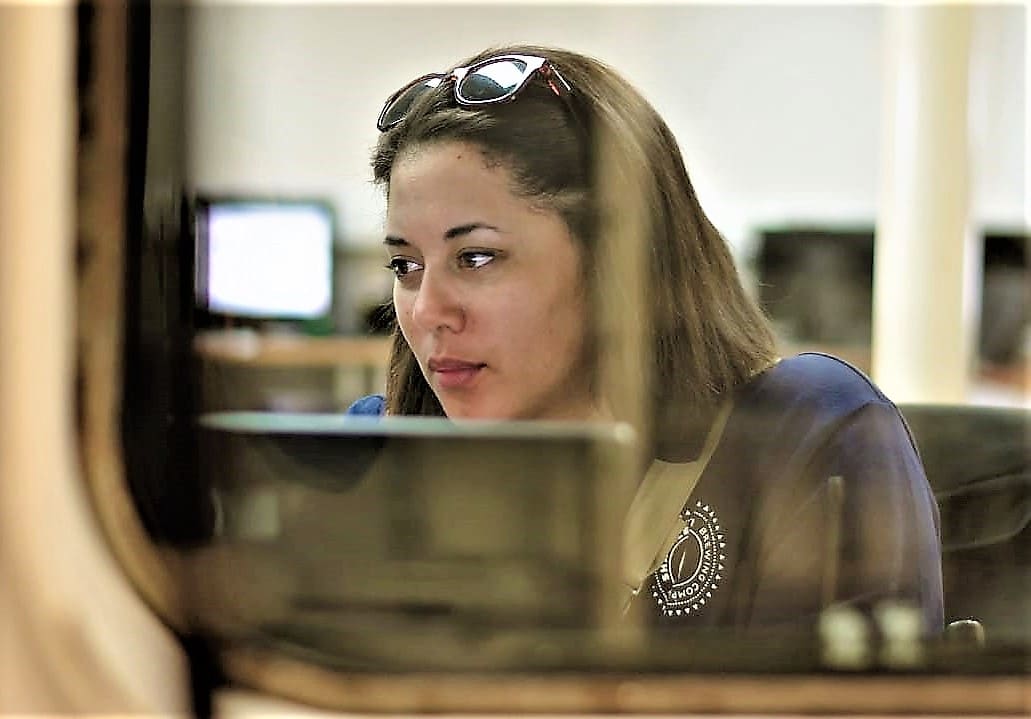
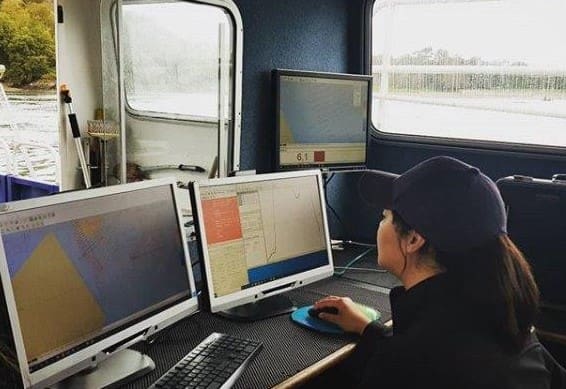
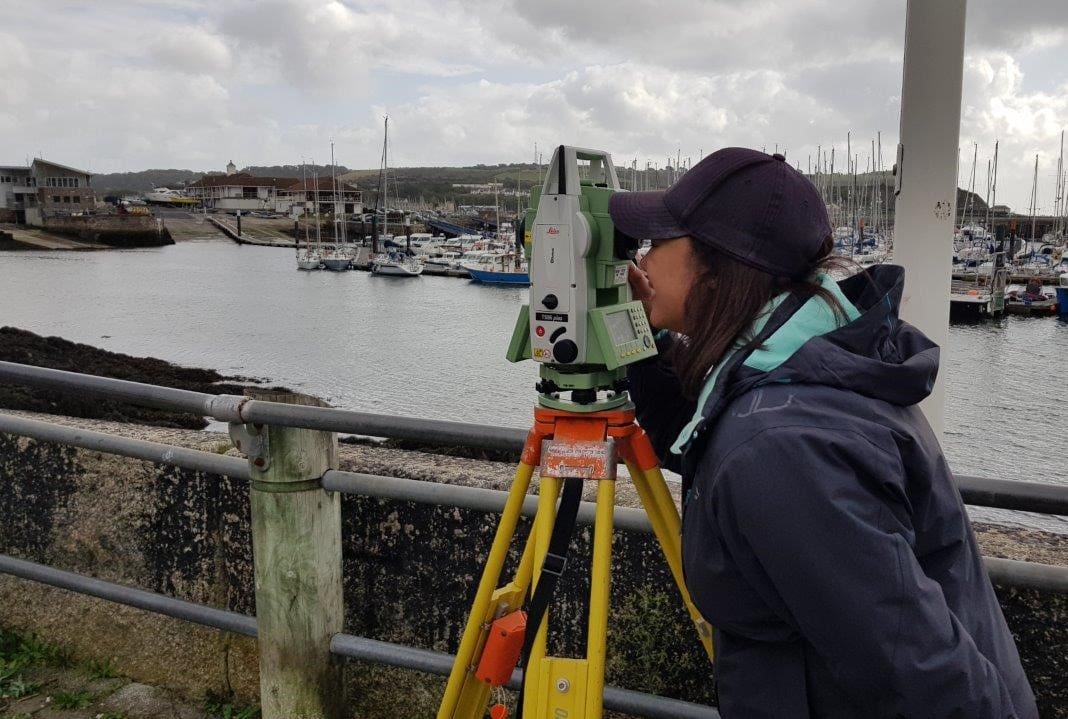 More recently I have been exposed to the commercial oceanographic industry by working as a marine technician for Lwandle Marine Technologies. Albeit a brief time spent with Lwandle, I have experienced a very different aspect of oceanography in practice. I worked on a variety of contracts utilising skills I’ve gained over the years such as commercial diving operations, in situ data collection and hands-on instrumentation repairs/maintenance. These contracts also opened the door to innovative ways of thinking, problem solving and team work. I was also involved in equipment sales, field trip logistics and ‘meet and greets’ with clients which have been a great learning opportunity.
More recently I have been exposed to the commercial oceanographic industry by working as a marine technician for Lwandle Marine Technologies. Albeit a brief time spent with Lwandle, I have experienced a very different aspect of oceanography in practice. I worked on a variety of contracts utilising skills I’ve gained over the years such as commercial diving operations, in situ data collection and hands-on instrumentation repairs/maintenance. These contracts also opened the door to innovative ways of thinking, problem solving and team work. I was also involved in equipment sales, field trip logistics and ‘meet and greets’ with clients which have been a great learning opportunity.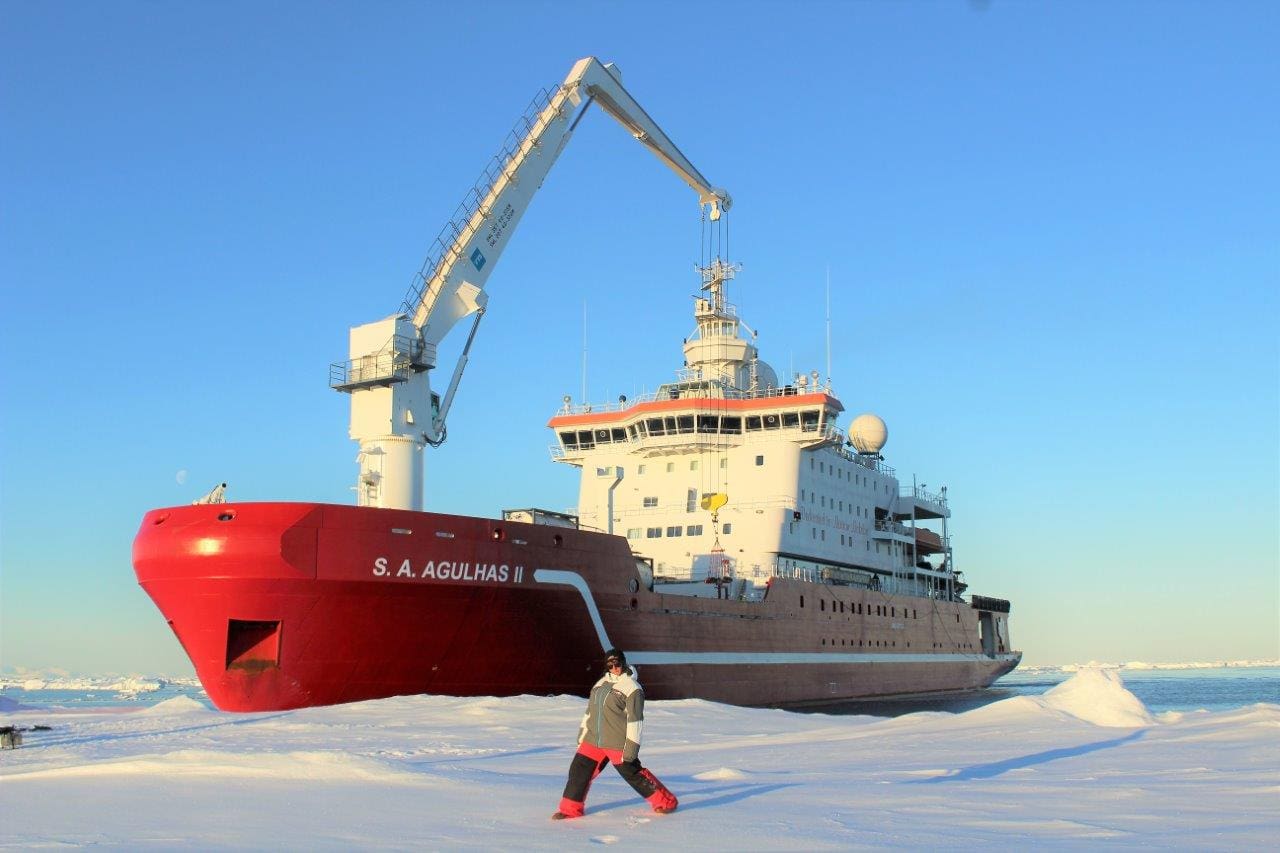
 In December 2018 I was hired by the
In December 2018 I was hired by the 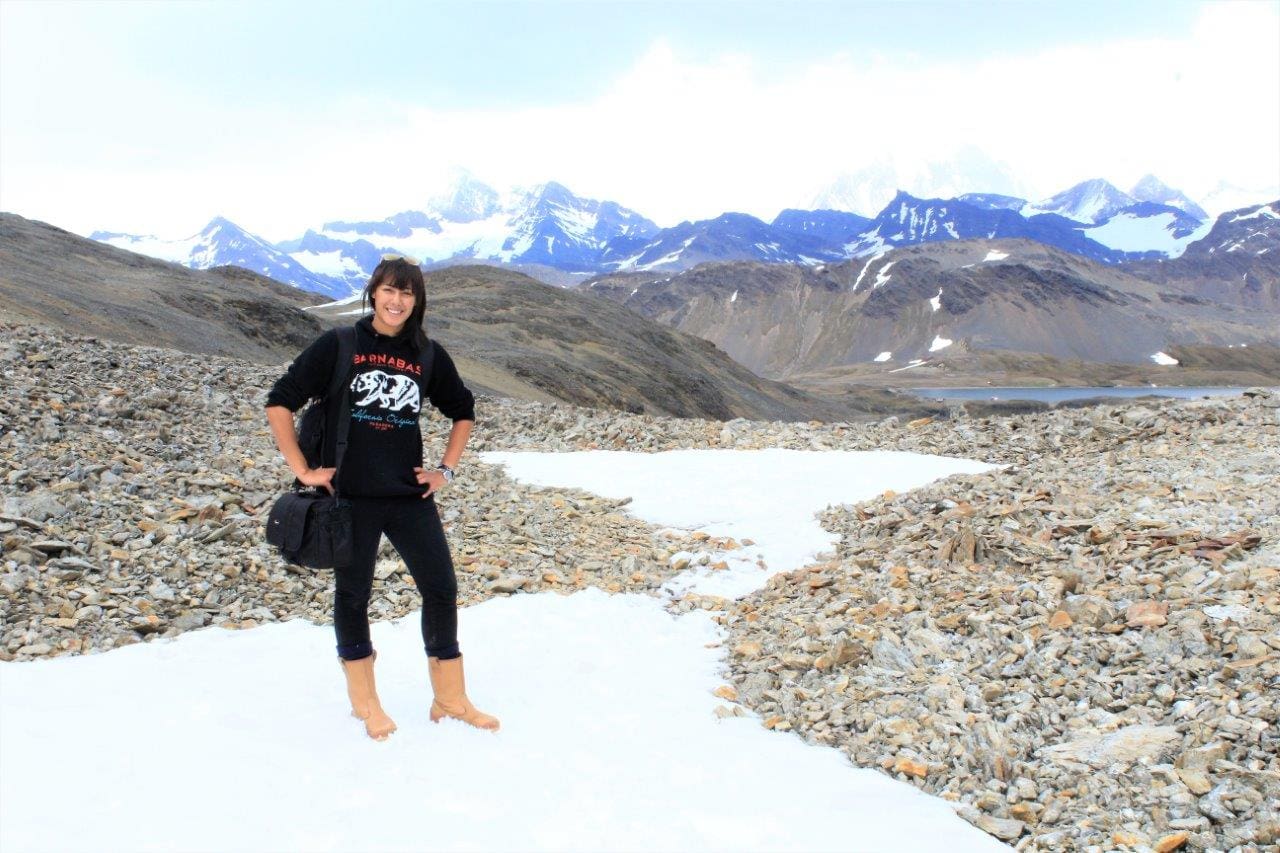 I love my career as it is ever changing and growing with the current climate or latest technological advances. I have been able to see the world, visit remote and beautiful locations, sail the high seas and build incredible bonds with fellow scientists. It isn’t always an easy journey, but conquering the challenge of this lifestyle and career choice is what makes it worthwhile. The sense of adventure is never ending and I’m always learning along the way. Madame Curie once said that nothing in life is to be fear but rather understood, so that we understand more and fear less. I think this gives us a great sense of pride in what we do and to strive to be curious about our world, to best understand, preserve it and pass the torch on to future generations.
I love my career as it is ever changing and growing with the current climate or latest technological advances. I have been able to see the world, visit remote and beautiful locations, sail the high seas and build incredible bonds with fellow scientists. It isn’t always an easy journey, but conquering the challenge of this lifestyle and career choice is what makes it worthwhile. The sense of adventure is never ending and I’m always learning along the way. Madame Curie once said that nothing in life is to be fear but rather understood, so that we understand more and fear less. I think this gives us a great sense of pride in what we do and to strive to be curious about our world, to best understand, preserve it and pass the torch on to future generations.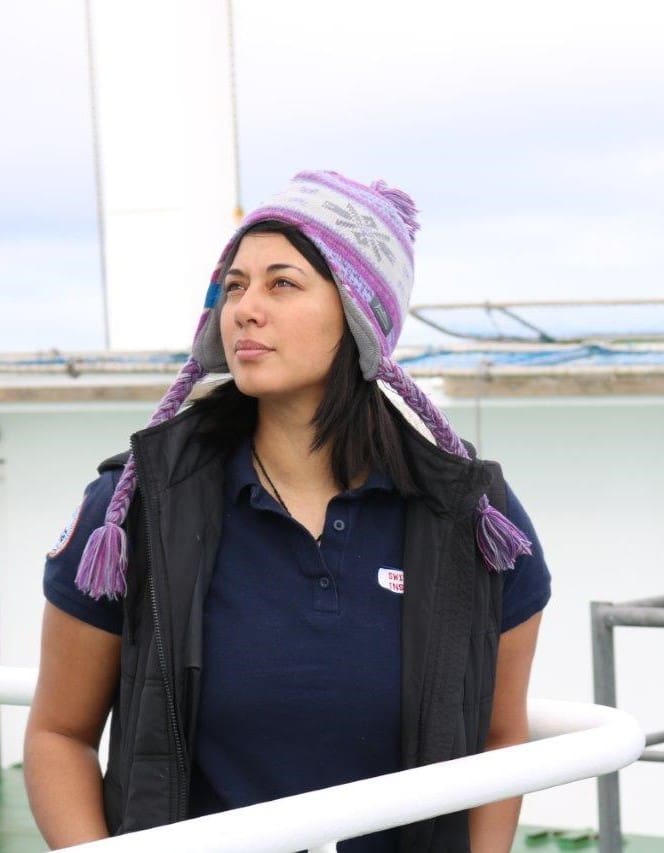 To future researchers, be diligent, work hard and persevere throughout your career. There will be challenging days but there will also be days that out shadow the challenges and fuel your passion for science. Always be teachable no matter your age, and always willing to learn and lend a hand to your fellow scientists. The work you do throughout your career will not only impact and improve your life but will pave the way for those coming up behind you. So take pride in what your work, rise up to the challenges and enjoy the journey! (Right: Photo credit:Alexander Oelofse during SEAmester)
To future researchers, be diligent, work hard and persevere throughout your career. There will be challenging days but there will also be days that out shadow the challenges and fuel your passion for science. Always be teachable no matter your age, and always willing to learn and lend a hand to your fellow scientists. The work you do throughout your career will not only impact and improve your life but will pave the way for those coming up behind you. So take pride in what your work, rise up to the challenges and enjoy the journey! (Right: Photo credit:Alexander Oelofse during SEAmester)



